Places on our 2024 summer school are filling fast. Don’t miss out. Enrol now to avoid disappointment
- How to Write a Great Essay for Different A-Level Subjects

In previous articles, we’ve given you lots of advice on how to write the perfect essay.

You should also read…
- 6 Practical Tips for Writing Better Essays
- How to Do Research for an Excellent Essay
However, the skills we’ve discussed up to now have been generic, and have not taken into account the fact that different subjects require different skills when it comes to writing excellent essays for them. In this article, we look at the particular skills needed to write great essays for individual A-level subjects, so that you can familiarise yourself with what you need to do to excel in whatever A-levels you happen to be studying.

Good English literature essays revolve around intelligent interpretation. The problem many students have with this is organising their interpretations into a tightly structured essay that flows well; many simply let their ideas run wild and flit aimlessly between one point and the next. To combat this problem, you need to consider the writer’s overall aims and then show how they have conveyed those aims, paragraph by paragraph, with each paragraph devoted to a particular technique or focus. A good structure to use is as follows:
- Point – make a statement, such as “Brontë uses the bleakness of the moorland setting to reflect Heathcliff’s temperament.”
- Explanation – elaborate on the statement in more detail. In this example, your explanation would involve explaining the parallels between Heathcliff and the moors – their unpredictability and wildness, for instance, and the violence of the weather mirroring Heathcliff’s violent personality.
- Evidence – now provide quotes from the text to back up what you mean. In the Heathcliff example, you could quote specific words and phrases that show similarities in the way Heathcliff is described and the way in which the moorland landscape and weather are described.
- Reiterate – close off the paragraph by reiterating the point, and perhaps developing it a little further or introducing the idea you’re going to carry into the next paragraph. For example, “This ties in with a wider theme running through the book as a whole, which is that nature parallels human emotions.”
Good English essays pay close attention to detail, noting specific words, phrases and literary devices a writer has used, and to what effect. They quote liberally from the text in order to support each point, deconstructing the writing and analysing the use of language; they look at different interpretations, seeing beyond the surface and picking up on possible deeper meanings and connotations. But they also consider the meaning of the piece as a whole, and the overall effect created by the specific details noted. All this should be considered within the framework of the genre and context of the piece of writing. For instance, a poem by William Wordsworth would be considered within the context of the Romantic poets, and might be compared with work by contemporary poets such as Shelley or Keats; the historical background might also be touched upon where relevant (such as the Industrial Revolution when discussing the poetry of William Blake).

Though it’s also a humanities subject, History requires its own very particular set of skills that differ to an appreciable degree from those expected of you in English. A history essay is unequivocal about its writer’s opinion, but this opinion must be based on a solid analysis of evidence that very often can’t be taken as fact. Evidence must be discussed in terms of its reliability, or lack thereof. The good historian considers what biases may be inherent in a source, what vested interest the source might have, and what viewpoint that source was written from. For instance, you might analyse a source by discussing whether or not the person was present at the events they are describing; how long after the events they were writing (and therefore whether they are remembering it accurately if they were there, or whether they are getting their information second or third hand from someone else; and if so, how reliable the original source is); whether they are trying to show evidence to support a particular political view; and so on. So, each time you make a point, back it up with evidence, and consider the strengths and weaknesses of that evidence. A good history essay makes connections between what’s been written about, considering how issues interrelate, so think about how what you’re writing about ties in with other things; what was the impact of the event you’re discussing, did it happen in isolation, and what were the events that led to it ?

It’s vital to look at both sides of the argument – or, where many possible viewpoints exist, to acknowledge these nuances. It’s fine to contradict yourself, provided you do so consciously; that is, you can build up an argument and then turn it on its head, observing that you are doing so (for example, “So far, so compelling; but what about the less well-known evidence from such and such?”). You can use quotes from historians you’ve read, but use these in the context of discussing scholarly opinion. Don’t quote a historian’s words as evidence of something, because this is only someone’s opinion – it’s not proof. Finally, where possible, use specialist terms to show that you know your stuff (“proletariat” instead of “workers”, for example).
The primary task that lies ahead of you in writing a French essay is, of course, to demonstrate your superior language skills. Keep the content itself very even-handed, sitting on the fence rather than presenting a forceful opinion that could distract attention away from the quality of your use of French. Focus on using as wide a variety of vocabulary and tenses as you can. It will help your essay if you can learn how to say more sophisticated phrases in French, of the sort you would use if you were writing an essay in English. This useful document from RealFrench.net, Writing Essays in French, will give you numerous useful French phrases to help you put together an impressive essay, including the vocabulary you need to present a balanced argument.

Geography is a subject that crosses the divide between the sciences and the humanities , considering both physical processes and human activities (and their effects on the world around us). Essays for Geography may differ depending on which of these focuses the essay is discussing, and the evidence you might include in your essay could vary from phenomena observed and data gathered in the natural world to the results of population censuses. To write a good Geography essay, you’ll need to include both theory and detailed, real-world case studies to support your answer. Mention specific places by name, and communicate the facts accurately. Your teacher will be assessing not just your knowledge, but your ability to support what you say with relevant information that proves it. You shouldn’t just rattle off everything you know about a particular case study; you should deploy relevant facts from the case study to support a specific point you’re trying to make. Keep linking each point back to the question, so that you’re always working towards answering it; this also helps you ensure that everything you include is actually relevant to the question. Showing that you’ve thought about an issue from multiple perspectives, and that you appreciate how they interrelate, is important in Geography. You can do this by organising the content of your essay into categories, considering different factors in turn, such as the scale of the issue, and the timeframe and environment involved. Discuss the various factors involved logically, one by one, such as the environmental impact of climate change or a natural disaster (such as a tsunami or volcanic eruption), followed by its physical, economic, social and political implications. Acknowledging the numerous nuances of the situation will demonstrate your appreciation of its complexity and show that you are thinking at a high level.
Classical Civilisations

As the study of the ancient world (primarily ancient Rome and Greece), Classical Civilisations combines archaeology and history, looking both at what survives materially (from small finds, to art and sculpture, to temples) and what survives in the way of texts by ancient authors. A good essay for this subject analyses, evaluates and interprets. The historical elements of the subject will require the same set of skills we discussed for History earlier, while the archaeological components of this subject require slightly different skills. With your archaeologist hat on, your job becomes similar to that of a detective, piecing together clues. Archaeology crosses over into science, and with that comes scientific considerations such as how archaeological evidence has been gathered – the methods used, their reliability, whether or not they could have been tampered with, how accurately they were recorded, and so on. You’ll look at a variety of different types of evidence, too, from the finds themselves to maps of the local topography. As with Geography, for which you’re required to learn lots of detailed case studies and names, you’ll need to learn plenty of examples of sites and finds to use as sources of evidence in building up a picture of the ancient world. And, as with any subject, looking at both sides of any argument is crucial to good grades. If the evidence you’re discussing could show one thing, but it could also show another, don’t just present one possibility – show that you’ve thought in depth about it and consider all the possible interpretations.
Science subjects

The sciences – Biology, Chemistry, Physics and Mathematics – are generally less essay-focused, so we’re grouping them together here because the essay skills required for each of these subjects are very similar. While the fundamentals of scientific essay writing are the same as any other subject – having a logical structure, well-developed argument, and so on – there are a few subject-specific considerations to bear in mind, and some common pitfalls to watch out for. The first is that there is no room for opinion in a scientific essay; unless you’re specifically asked for it, leave your own thoughts out of it and focus instead on a completely objective discussion of the evidence gathered through scientific research, which will most probably be quantitative data. Avoid vague language such as “it is thought that…”; be as precise as possible. Start with a hypothesis, and then discuss the research that supports or disproves it. Back up every statement you make with solid data; it’s not enough simply to drop in the name of the research, so briefly describe what the findings were and why they prove the statement you’ve just made. Another mistake many students make is to confuse cause and effect; this arises because of the tendency to assume that correlation implies causation, which is a common logical fallacy. Just because two things appear to be related, it doesn’t mean that one caused the other, and committing this error in an essay is a major faux pas that will lose you marks. It’s also a good idea to ensure that you’ve included every piece of research that could be relevant; if you don’t, you could be leaving out a crucial piece of evidence. Finally, mention any limitations there may have been with the methodology used to gather the data you discuss.

Psychology essays are best approached with a scientific mindset, but it’s far more difficult to prove anything in this subject – and this should be acknowledged in your essay. The task becomes one of assessing which theory is the more probable one, based on an analysis of the data from various studies. Make liberal reference to named and dated psychological experiments and research, but acknowledge the fact that there may be more than one theory that could account for the same set of results. When these experiments are quoted as evidence, this should be done with reference to any possible limitations of how the experiment was conducted (such as a small sample size). If you’ve reached the end of this article, you’re now equipped with the knowledge to write fantastic essays guaranteed to impress your teachers. You’re also well on the way to thinking in the right way for university-level essays, so keep working on these skills now and you’ll find it much easier to make the leap from sixth former to undergraduate.
Image credits: banner ; Wuthering Heights ; Diet of Worms ; factory workers ; Charioteer ; Hubble Space Telescope ; Psychology .
- Learning Tips
- Exam Guides
- School Life
Essay based Subjects: What they are and Some Examples
- by Joseph Kenas
- February 11, 2024
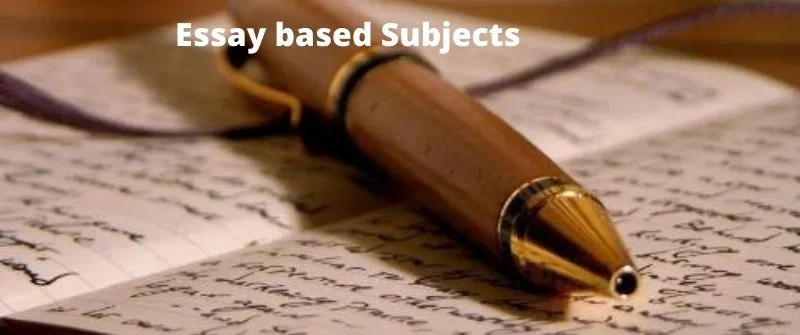
Essay writing is a very important part of your academic studies. In your academic journey, you will find essay-based subjects that will require you to write an essay on a particular topic.
Always remember that an essay is just an argument or discussion about a topic. Therefore, you have to write an essay that includes paragraphs each having a theme or purpose.
No matter the subject you are writing about, essays can be simple to write as long as you follow the right structure.
What is an Essay Based Subject?
In high school, college, or university, the number of essays you write will depend on the subject you have chosen. Subjects that need the student to write a lot of essays for the exams are referred to as essay-based subjects .
History, languages, economics, and literature are some of the subjects that require a student to write frequent essays.

Yet still, most of the humanity and social science subjects also need a lot of research and writing of essay papers.
Most essay-based subjects require the student to have analytical skills that enable good research for writing papers.
Students who choose these types of subjects need to practice critical thinking at all times.
A good example is English literature and History. If a student does not have these skills, writing a good essay will become a problem.
For other essay-based subjects such as physics, students need to be familiar with scientific principles before they can write good essays.
Creativity in thinking and a demonstration of self-discipline are important if you want to achieve good grades in these subjects. Nurture your study skills as a student to excel in subject-based essays
There are also practical subjects such as Music and Art which also have essay writing in some areas. Without imaginative and inventive skills, these subjects will not be easy to pass.
Is Psychology an Essay-Based Subject?
Psychology is an essay-based subject in many ways. If you are pursuing a degree in psychology, you have to know how to write compelling essays which will be part of your final grades.
The writing of essays in psychology gives students a good opportunity to explore different aspects of this subject. As a psychology student, essay writing allows you to investigate deeply a topic you have chosen.
As long as the topic is within the subject of psychology, professors do give students the privilege to write about what they prefer. In the end, you will be able to sharpen your research, analytical, evaluation and communication skills.
Since psychology revolves around the study of behavior, essay writing can help to enhance a student’s understanding of behaviors.
Research for essay writing from a psychology perspective will allow the student to learn terms and methods in this subject.
Psychology is a subject that needs a proper understanding of the methodologies involved. Without adequate knowledge and understanding of this subject, writing a good essay will be difficult.
The choice of essay topic on this subject can be on an area covered in the course. However, students can also choose a good topic of their interest that does not relate to the subject content.
As long as you select a field in psychology that you have an interest in, you can write a good essay.
30 Essay Based Subjects

- Anthropology
- Archaeology
- Environmental science
- Ancient history
- English language
- English literature
- Classical civilization
- Government and politics
- Health and social care
- Media studies
- History of art
- Criminology
- Religious studies
- Design and technology
- Product design
- Political science
- Global politics
How to Study and Pass Essay Based Subjects
It is not easy to prepare for exams involving essay-based subjects. If you want to pass with a good grade, you have to make the most out of your revision. Practice essay writing tips to keep you focused.
Below are effective tips on how to study and pass essay based subjects:
1.Be a Friend of the Teacher
Teachers play a very important role in helping you pass exams. This is what will propel you to the next level of education or give you a good job.
However, they have to prepare hundreds of students for the exams. As such, they may not be able to tell you everything unless you ask.
If you are a friend of the teacher, it will be easy to ask questions and get good tips on how to prepare for your exams. You’ll also not be the students who have excuses to submit their assignments late.
Most teachers are willing to extend a helping hand to students so that they have an easy time preparing for exams. Therefore, when you need help in your study and revision, take advantage of the teacher’s help.
2. Plan your Revision
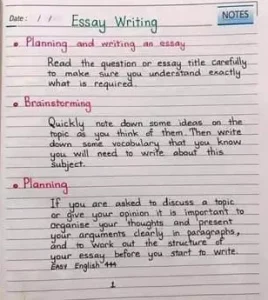
With proper planning, revising for essay-based subjects can be effective. You should start your revision in time so that you do not have to cram everything on the last day of the exam.
If you start revising early, you can have small amounts of time dedicated to each subject or topic.
Small revision parts each day for a longer period are more effective than trying to cram everything the night before your exams.
Also, you can plan to revise one subject at a time or alternate revisions between various subjects of study.
What you need is a suitable revision pattern that works well for you. All in all, always make revision a habit. Create specific set times of the day to revise and ensure you stick by it.
3. Relaxing Activities
Even though studying for essay-based exams needs a lot of preparation, interspersing with relaxing activities is also advisable.
This helps to stop the overloading of the brain especially when you feel exhausted. You can take a walk, listen to your favorite music or take part in sports.
Just take part in whatever activity you like but ensure the breaks do not become distractions.
4. Avoiding Distractions
Effective studying for exams cannot go well if there are distractions. Social media platforms such as WhatsApp and Instagram are the greatest enemies. Develop routines to help you use your free time productively.
Notifications from friends will always pop up and distract you from studying. One way of avoiding this is by installing a locking app so that you can disable your social media for a specific period.
Another alternative is to block your web browser or the internet router. You can block access and create a restriction for a specific period.
With help from friends and family members, have a blocking schedule. Far from that, find a quiet place where you can do your revisions effectively.
If there is no quiet place at home, the nearby library is the best place where you can study comfortably.
5. Create a Glossary
When the exam period approaches, it is good to come up with a list of all the important words and phrases that you need to know.
For each of the modules, ensure you list important phrases that you need to remember. Have a brief definition of each of the terms which are important for the exams.
You can then go back to your glossary and test your ability to remember these terms.
6. Practice Essay Writing Regularly
Regularly writing essays will give you a clue about how to go about your exams. It makes you master the time you will need to plan, write and proofread your essay.
With the use of past papers, you can know the type of questions that are frequently asked in your area of study. This will boost your flexibility and confidence because you will be familiar with all the course materials.

Joseph is a freelance journalist and a part-time writer with a particular interest in the gig economy. He writes about schooling, college life, and changing trends in education. When not writing, Joseph is hiking or playing chess.

- UCAS Guide Home >
- A-Level English Literature
How to Write an A-Level English Literature Essay
Writing an A-level English Literature essay is like creating a masterpiece. It’s a skill that can make a big difference in your academic adventure.
In this article, we will explore the world of literary analysis in an easy-to-follow way. We’ll show you how to organise your thoughts, analyse texts, and make strong arguments.
The Basics of Crafting A-Level English Literature Essays
Understanding the Assignment: Decoding Essay Prompts
Writing begins with understanding. When faced with an essay prompt, dissect it carefully. Identify keywords and phrases to grasp what’s expected. Pay attention to verbs like “analyse,” “discuss,” or “evaluate.” These guide your approach. For instance, if asked to analyse, delve into the how and why of a literary element.
Essay Structure: Building a Solid Foundation
The structure is the backbone of a great essay. Start with a clear introduction that introduces your topic and thesis. The body paragraphs should each focus on a specific aspect, supporting your thesis. Don’t forget topic sentences—they guide readers. Finally, wrap it up with a concise conclusion that reinforces your main points.
Thesis Statements: Crafting Clear and Powerful Arguments
Your thesis is your essay’s compass. Craft a brief statement conveying your main argument. It should be specific, not vague. Use it as a roadmap for your essay, ensuring every paragraph aligns with and supports it. A strong thesis sets the tone for an impactful essay, giving your reader a clear sense of what to expect.
Exploring PEDAL for Better A-Level English Essays
Going beyond PEE to PEDAL ensures a holistic approach, hitting the additional elements crucial for A-Level success. This structure delves into close analysis, explains both the device and the quote, and concludes with a contextual link.
Below are some examples to illustrate how PEDAL can enhance your essay:
Clearly state your main idea.
Example: “In this paragraph, we explore the central theme of love in Shakespeare’s ‘Romeo and Juliet.'”
Pull relevant quotes from the text.
Example: “Citing Juliet’s line, ‘My only love sprung from my only hate,’ highlights the conflict between love and family loyalty.”
Identify a literary technique in the evidence.
Example: “Analysing the metaphor of ‘love sprung from hate,’ we unveil Shakespeare’s use of contrast to emphasise the intensity of emotions.”
Break down the meaning of the evidence.
Example: “Zooming in on the words ‘love’ and ‘hate,’ we dissect their individual meanings, emphasising the emotional complexity of the characters.”
Link to Context:
Connect your point to broader contexts.
Example: “Linking this theme to the societal norms of the Elizabethan era adds depth, revealing how Shakespeare challenges prevailing beliefs about love and family.”
Navigating the World of Literary Analysis
Breaking Down Literary Elements: Characters, Plot, and Themes
Literary analysis is about dissecting a text’s components. Characters, plot, and themes are key players. Explore how characters develop, influence the narrative, and represent broader ideas. Map out the plot’s structure—introduction, rising action, climax, and resolution. Themes, the underlying messages, offer insight into the author’s intent. Pinpointing these elements enriches your analysis.
Effective Text Analysis: Uncovering Hidden Meanings
Go beyond the surface. Effective analysis uncovers hidden layers. Consider symbolism, metaphors, and imagery. Ask questions: What does a symbol represent? How does a metaphor enhance meaning? Why was a particular image chosen? Context is crucial. Connect these literary devices to the broader narrative, revealing the author’s nuanced intentions.
Incorporating Critical Perspectives: Adding Depth to Your Essays
Elevate your analysis by considering various perspectives. Literary criticism opens new doors. Explore historical, cultural, or feminist viewpoints. Delve into how different critics interpret the text. This depth showcases a nuanced understanding, demonstrating your engagement with broader conversations in the literary realm. Incorporating these perspectives enriches your analysis, setting your essay apart.
Secrets to Compelling Essays
Structuring your ideas: creating coherent and flowing essays.
Structure is the roadmap readers follow. Start with a captivating introduction that sets the stage. Each paragraph should have a clear focus, connected by smooth transitions. Use topic sentences to guide readers through your ideas. Aim for coherence—each sentence should logically follow the previous one. This ensures your essay flows seamlessly, making it engaging and easy to follow.
Presenting Compelling Arguments: Backing Up Your Points
Compelling arguments rest on solid evidence. Support your ideas with examples from the text. Quote relevant passages to reinforce your points. Be specific—show how the evidence directly relates to your argument. Avoid generalisations. Strong arguments convince the reader of your perspective, making your essay persuasive and impactful.
The Power of Language: Writing with Clarity and Precision
Clarity is key in essay writing. Choose words carefully to convey your ideas precisely. Avoid unnecessary complexity—simple language is often more effective. Proofread to eliminate ambiguity and ensure clarity. Precision in language enhances the reader’s understanding and allows your ideas to shine. Crafting your essay with care elevates the overall quality, leaving a lasting impression.
Mastering A-level English Literature essays unlocks academic success. Armed with a solid structure, nuanced literary analysis, and compelling arguments, your essays will stand out. Transform your writing from good to exceptional.
For personalised guidance, join Study Mind’s A-Level English Literature tutors . Elevate your understanding and excel in your literary pursuits. Enrich your learning journey today!
How long should my A-level English Literature essay be, and does word count matter?
While word count can vary, aim for quality over quantity. Typically, essays range from 1,200 to 1,500 words. Focus on expressing your ideas coherently rather than meeting a specific word count. Ensure each word contributes meaningfully to your analysis for a concise and impactful essay.
Is it acceptable to include personal opinions in my literature essay?
While it’s essential to express your viewpoint, prioritise textual evidence over personal opinions. Support your arguments with examples from the text to maintain objectivity. Balance your insights with the author’s intent, ensuring a nuanced and well-supported analysis.
Can I use quotes from literary critics in my essay, and how do I integrate them effectively?
Yes, incorporating quotes from critics can add depth. Introduce the critic’s perspective and relate it to your argument. Analyse the quote’s relevance and discuss its impact on your interpretation. This demonstrates a broader engagement with literary conversations.
How do I avoid sounding repetitive in my essay?
Vary your language and sentence structure. Instead of repeating phrases, use synonyms and explore different ways to express the same idea. Ensure each paragraph introduces new insights, contributing to the overall development of your analysis. This keeps your essay engaging and avoids monotony.
Is it necessary to memorise quotes, or can I refer to the text during exams?
While memorising key quotes is beneficial for a closed text exam, you can refer to the text during open text exams. However, it’s crucial to be selective. Memorise quotes that align with common themes and characters, allowing you to recall them quickly and use them effectively in your essay under time constraints.
How can I improve my essay writing under time pressure during exams?
Practise timed writing regularly to enhance your speed and efficiency. Prioritise planning—allocate a few minutes to outline your essay before starting. Focus on concise yet impactful analysis. Develop a systematic approach to time management to ensure each section of your essay receives adequate attention within the given timeframe.
Still got a question? Leave a comment
Leave a comment, cancel reply.
Save my name, email, and website in this browser for the next time I comment.
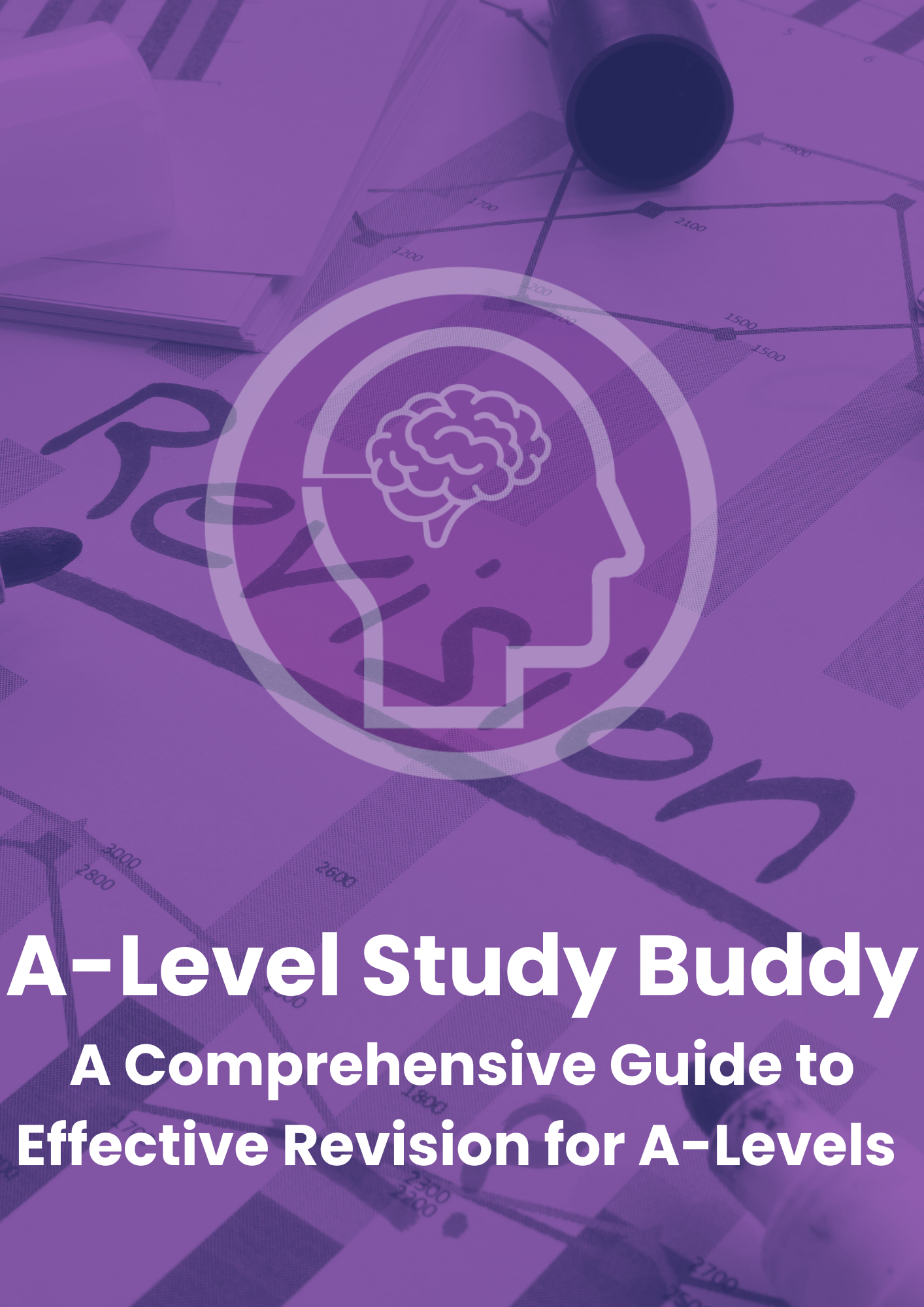
Let's get acquainted ? What is your name?
Nice to meet you, {{name}} what is your preferred e-mail address, nice to meet you, {{name}} what is your preferred phone number, what is your preferred phone number, just to check, what are you interested in, when should we call you.
It would be great to have a 15m chat to discuss a personalised plan and answer any questions
What time works best for you? (UK Time)
Pick a time-slot that works best for you ?
How many hours of 1-1 tutoring are you looking for?
My whatsapp number is..., for our safeguarding policy, please confirm....
Please provide the mobile number of a guardian/parent
Which online course are you interested in?
What is your query, you can apply for a bursary by clicking this link, sure, what is your query, thank you for your response. we will aim to get back to you within 12-24 hours., lock in a 2 hour 1-1 tutoring lesson now.
If you're ready and keen to get started click the button below to book your first 2 hour 1-1 tutoring lesson with us. Connect with a tutor from a university of your choice in minutes. (Use FAST5 to get 5% Off!)
We value your privacy
We use cookies to allow this site to work for you, improve your user experience, and to serve you advertising tailored to your interests. Let us know if you agree to all cookies. You can manage your preferences at any time
Your Privacy
We use cookies, which are small text files placed on your computer, to allow the site to work for you, improve your user experience, to provide us with information about how our site is used, and to deliver personalised ads which help fund our work and deliver our service to you for free.
The information does not usually directly identify you, but it can give you a more personalised web experience.
You can accept all, or else manage cookies individually. However, blocking some types of cookies may affect your experience of the site and the services we are able to offer.
You can change your cookies preference at any time by visiting our Cookies Notice page. Please remember to clear your browsing data and cookies when you change your cookies preferences. This will remove all cookies previously placed on your browser.
For more detailed information about the cookies we use, or how to clear your browser cookies data see our Cookies Notice
Manage consent preferences
These cookies are necessary for the website to function and cannot be switched off in our systems.
They are essential for you to browse the website and use its features.
You can set your browser to block or alert you about these cookies, but some parts of the site will not then work. We can’t identify you from these cookies.
These help us personalise our sites for you by remembering your preferences and settings. They may be set by us or by third party providers, whose services we have added to our pages. If you do not allow these cookies, then these services may not function properly.
These cookies allow us to count visits and see where our traffic comes from, so we can measure and improve the performance of our site. They help us to know which pages are popular and see how visitors move around the site. The cookies cannot directly identify any individual users.
If you do not allow these cookies we will not know when you have visited our site and will not be able to improve its performance for you.
These cookies may be set through our site by social media services or our advertising partners. Social media cookies enable you to share our content with your friends and networks. They can track your browser across other sites and build up a profile of your interests. If you do not allow these cookies you may not be able to see or use the content sharing tools.
Advertising cookies may be used to build a profile of your interests and show you relevant adverts on other sites. They do not store directly personal information, but work by uniquely identifying your browser and internet device. If you do not allow these cookies, you will still see ads, but they won’t be tailored to your interests.
The shortcut to your shortlist
Make your university search faster and less stressful. Get a personalised shortlist by selecting what matters to you.
- CHOOSE ONE OR MORE
Popular universities
- University of Kent
- University of East Anglia UEA
- University of Chester
- Coventry University
- University of Aberdeen
- University of Portmouth
- Nottingham Trent University
- University of Sunderland
- London Metropolitan University
- London South Bank University
- University of East London
- BROWSE ALL UNIVERSITIES
Course search
Popular undergraduate courses.
- Computer Science
- LLB Bachelor of Laws
- Biomedical Sciences
- Physiotherapy
- Sports Science
Open days search
Upcoming open days.
- University of Glasgow
- Ravensbourne University London
- University of Gloucestershire
- University of Southampton
Article search
Popular articles.
- What is UCAS Extra?
- Replying to offers
- What's a university open day
- Student finance and funding
- Types of degree in the UK
- BROWSE ALL ARTICLES
Popular topics
- Choosing what to study
- Choosing where to study
- Applying to university
- League tables
- Student life - after you start
Choosing A Levels
Choosing your a level subjects is a big decision. read our advice on how to decide, whether you know what you want to study at university or not..
What are A Levels?
Which subjects should you choose, university courses with specific requirements.
A Levels (Advanced Levels) and AS Levels (Advanced Subsidiary) are courses that students in England, Wales and Northern Ireland take after GCSEs. They're the most common qualifications for university admission. Other qualifications include Scottish Highers/Advanced Highers and other alternatives to A Levels .
A Levels are two-year qualifications that give students a chance to study an existing GCSE subject in greater depth or try a completely new subject like Law, Drama or Economics.
What to expect from A Levels
- An increase in difficulty compared to GCSEs
- Differences in the way you’re taught and what's expected from you
- More independent study time – you'll only have between three and five subjects to study as opposed to ten or more at GCSE, meaning less time in the classroom
How many A Levels can you take?
Students can take up to five A Levels but you generally choose three A Levels to study for a two-year course. You can decide to work towards AS qualifications or combine the two. Discuss your options with your school or college and find out whether they'll offer both AS and A Levels so you can decide the best route for you. The vast majority of schools and colleges now focus on A Levels, with the one-year AS Level less popular and available.
If you already know what you’d like to study, you can contact the university admissions office and ask about entry requirements for the course(s) you’re interested in.
How many GCSEs do you need to do A Levels?
Most schools and colleges will expect you to have gained at least five 9–4 (A*–C) grades in your GCSEs. However, other pathways are available including BTEC and other vocational courses.
Requirements can vary from four to six passes, so you should check with your school or college. Often you'll need a GCSE at grade 5–6 (B) or above in a subject if you want to continue it at A Level.
GCSEs have also changed in recent years, with most students in England now getting new numerical grades (9–1) and changes to exams, coursework and specifications.

Take advice from your school careers advisor and university admissions departments so you can make an informed decision based on accurate and up-to-date information. It’s worth asking questions and researching entry requirements for courses at various universities to get a good idea of the subjects you should take.
Things to consider when choosing your A Levels
If you want to go to university, the main question to ask yourself is: 'Do I know what I want to study at university?'. Your answer will dictate which subjects you should choose for A Levels.
It’s perfectly normal not to know what you want to do for a career, or what you want to study at university. Many graduates go on to work in fields unrelated to their chosen degree. However, if you have aspirations for a certain career, you'll need to take a related degree. For example, subjects such as Law, Medicine, Architecture and Veterinary Science will all need specific qualifications.
If you already know what you want to study at university
Knowing what you want to study at university puts you in a good position when choosing your A Levels. Your first step should be to check entry requirements on university websites for your chosen course.
A lot of courses will specify at least one subject you'll need to have studied at A Level. For example, Medicine, Veterinary Science and certain Engineering courses may need three specific subjects. Also some universities publish a list of preferred A Level subjects that are acceptable for general admission, as well as specific requirements for individual courses.
If you don't know what you want to study at university
You may not be sure what you want to study at university, or if you want to go at all. Don’t worry, as it means you can choose whichever subjects you want (within reason) and let that dictate your degree choice should you go on to study at university.
There are eight 'facilitating' subjects listed by Russell Group universities to help you keep your degree options open until you decide which course to take:
- English Literature
- Maths and Further Maths
- Modern and Classical Languages
Generally speaking, taking two facilitating subjects will keep a wide range of degrees open to you. Make sure you still choose subjects you like – you'll be studying them for the next two years.
If you’re still uncertain, phone or email the university admissions or schools liaison team for their advice before finalising your choices.
Other factors to consider when choosing A Levels
- What you're good at – your career or degree plans may change so make sure you choose subjects you can do well in
- What you enjoy – if you don’t enjoy a subject at A Level but need it for a specific university course, you might want to reconsider your degree preference
- Your subject combination – if you're taking a science A Level, for example, you should consider whether you need to look at taking another science or maths subject
- The syllabus – knowing the course content should tell you whether a particular A Level is the right option for you
- The workload you can handle – for example, some courses may involve a lot of essay writing, so be realistic about how much work you can do
Course entry requirements are used to help admissions staff at universities pick students for their courses. Many courses will have more applicants than places so they'll set an entry requirement to allow them to reduce the number of students to consider.
Specific course requirements (e.g. Chemistry and Biology for a Biochemistry course) are there to make sure students can cope with the pressures of the course content itself. The majority of university courses look for at least Cs in GCSE English and Maths. Some courses go further and list specific subjects and grades they expect you to have.
Remember that some courses may only consider certain A Level qualifications or accept certain qualifications when taken with another. This will depend on what the university department is looking for.
For example, a History department may be looking for students who can write essays and handle exams, and so might have a preference for A Level or Highers students. If you’re a BTEC student, look out for courses that name specific units you need to pass with specific grades.
Check our subject guides to see if a course might need specific A Level subjects (or equivalent).
Keep in mind
- Some universities discourage students from taking certain combinations of A Levels – this tends to be for very similar subjects such as Business Studies and Economics, or Maths and Further Maths
- Core Maths generally isn't a suitable substitute for AS or A Level Maths or Further Maths
- If you do too many practical or vocational subjects (such as PE, Music Technology, Media Studies, Textiles or Drama), it may limit what you can study at university – some universities include these in lists of 'non-preferred' subjects
- Highly selective courses such as Medicine may state that A Levels should be taken in the same sitting after no more than two years of study – this can affect you if you're looking to repeat some exams after sixth form or if you’ve taken some exams early
Related articles

Study Artificial Intelligence, why & how to study
With Artificial Intelligence (AI), you can construct intelligent systems that support our...

Study Nursing, why & how to study
Read about studying Nursing and what it’s like to be a nurse – to see if it could be the...

Study Manufacturing & Production Engineering, why...
If you enjoy both analytical thinking with a creative approach, read on to see how...
Is this page useful?
Sorry about that..., how can we improve it, thanks for your feedback.

Arts Sciences
- Preferred A Levels

Preferred UK GCE A Levels for Arts and Sciences
- Subjects marked with an asterisk (*) will only be counted as an essay-based subject if there is a minimum 50% essay-based or written response assessment as part of the overall award. This may vary by exam board so please contact us if you have any queries about this.
- Mathematics and Further Mathematics can be considered as two separate A Levels.
- If a student takes an A Level in their native language, it is at the discretion of UCL as to whether this will be considered as a 'humanities' A Level for the purposes of Arts and Sciences (BASc). Please contact us if you have a specific query.
- UCAS Y000 - BASc Arts and Sciences (3 years)
- UCAS Y001 - BASc Arts and Sciences with Study Abroad (4 years)
- Study Abroad at UCL (Affiliate/Exchange students)
Essential Links
- How to Apply
- Register your interest in UCL
- Visiting UCL
- International Students
- Scholarships and Funding
- Accommodation
- International edition
- Australia edition
- Europe edition

A-level choices: which subjects should you pick?
I t's that nailbiting time of the school year when prospective sixth-form students must choose which A-levels to do. Those who plan to go on to university will be hoping to pick the perfect combination that will ensure a place on their course of choice.
But it's hardly surprising if, aged 15, you don't have much of an idea what degree you want to do, let alone the shape of your future career. So Guardian Students has asked university admissions departments and sixth-form tutors to answer some of the questions pupils ask as they try to figure out which subjects to take.
Which A-level subjects are blacklisted by the more prestigious universities?
"An A-level subject blacklist does not exist, but certain universities do require particular subjects for particular courses, and applicants applying without these subjects will often not be considered," says Julian Skyrme, head of undergraduate recruitment and widening participation at the university of Manchester. In some cases it's obvious: you need to take science subjects to apply for medicine and dentistry, but in others, Skyrme says, the requirement "may be more subtle". A drama course might require that you have at least one essay-based A-level, for example. It's time consuming, but to be safe you need to look at the detailed entry criteria given by each university for individual degree courses you think you might be interested in.
What are the Russell group "facilitating subjects" and what does the term mean?
The Russell Group, to which some of the UK's most prestigious universities belong, publishes a guide called Informed Choices . It tells you the most common subject requirements for different degree courses at those universities. It also features a list of "facilitating subjects" and advises pupils wanting to be considered for a Russell Group university to pick two of them as part of their A-level mix. The facilitating subjects are: mathematics and further mathematics, English literature, physics, biology, chemistry, geography, history and languages (classical and modern).
Will universities really consider a BTec as equivalent to an A-level?
"Some will, some won't," says Matt Cole, head of modern history and politics at King Edward VI college in Stourbridge. "And I've seen departments that will one year, and won't another. There may also be a difference in what universities say they will consider and what in reality they do. They may consider BTecs – but not equally."
It depends on the type of course, adds Laura Lane, from the admissions service at Sheffield University. "The general rule is that BTecs should be in a relevant subject area to the degree a pupil wants to do."
"Students who are considering studying a BTec or another more vocational qualification (such as applied double-award A-levels) should research university entry requirements very carefully," says Skyrme, who points out that all universities publish precise details of what will be required both on their own websites and on the Ucas website.
"Sometimes universities will only be able to accept these sorts of qualifications when combined with other qualifications. For example, some engineering courses at university require students to have an A-level in maths alongside their BTec diploma, to ensure they have the mathematical skills required to complete the degree successfully."
Do teachers put pressure on pupils to take "easier" subjects to keep the school's results high?
Suspicion was voiced in comments on a Guardian Students feature last year that some schools advise pupils not to risk getting lower grades by taking on "hard" subjects at A-level. But Ian Hunt, MD of Gabbitas Education says: "I think what you'll find is that the pressure comes from the individual [school] department wanting to pick the best students to do their subjects, not an overarching directive from above."
At King Edward VI college, which last year saw 86% of its A-level pupils apply successfully to university, "we'd be encouraging pupils to play to their strengths", says Cole. Pupils occasionally do have to be guided away from a particular choice though – "there are some subjects, such as further maths, where you would have had to get a very good GCSE result to be accepted for A-level". Cole says teachers would make sure pupils understood that this was because you'd be unlikely to cope with the subject without a strong aptitude for maths.
If you feel you're being pushed towards subjects you don't want to do, what should you do?
"Teachers and parents can be a great source of advice to students; teachers especially can provide an honest insight into students' academic strengths," notes Skyrme. "However, students shouldn't be pressured into taking subjects they don't want to study, or that they don't feel confident about. Students should remember that it is they who will be studying the course, and taking the exams at the end of it, so it really must be a personal choice."
Should your GCSE grades dictate which subjects you pick at A-level?
For some subjects, you should take your GCSE grades very seriously, says Hunt. "Take maths: it's the sort of subject that if you don't get an A* at GCSE, it becomes a really big leap at AS and A-level and you need to consider that." But, he adds, this doesn't apply in all subjects – "for the humanities it's not nearly so strict a rule."
Do universities look at your GCSE results?
"Performance at 15 or 16, and sometimes even 14 if you take a GCSE early, isn't necessarily a good indicator of whether you'll be a good undergraduate and do well when you sit your finals," says Cole. But GCSEs – together with AS-levels – are the first filters that universities will use, simply because of the numbers they're dealing with. Most universities don't interview any more, Cole points out, so they've lost a valuable way of making a judgment, and in turn must rely more on a pupil's past performance.
"GCSE results do have a great bearing on university acceptances in some subjects," says Hunt. "Certain universities see GCSEs as great predictors. Oxford do, for instance."
How can you keep your options open?
Reality check: growing up is about making choices, and you can't keep every option open. But it may be useful to ask yourself if you really need to. If you're pretty sure you want to do medicine or engineering, then you can stop agonising: you need to narrow, not widen, your subject choice. But, says Lane, if you're not set on a particular area, "play to [your] strengths, but don't specialise in one area too much".
You could consider not doing A-levels at all. "The International Baccalaureate doesn't suit everyone, but if you're bright and want to keep your options open, that can be the best option," suggests Hunt.
Young people need to think carefully about what they enjoy and what they're likely to excel at, says Louise Banahene, education outreach manager at Leeds university. "If you study at least two of the facilitating subjects – ones you're interested in and good at – then the options are as wide as possible."
Skyrme says it's worth noting that by choosing facilitating subjects, pupils aren't restricted to applying for degree courses that require those subjects. "Even if a student studies three facilitating subjects, they would still be able to apply to study law, for which most universities do not require any specific subjects."
Should you always do maths A-level if you're capable of getting a decent grade, even if your interests lie elsewhere?
Most of the experts said no to this question: unless you want to do a maths- or science-based degree, it's not likely to be required. Skyrme suggests that students ask themselves a series of questions to decide: Will I enjoy maths A-level? Do I need it for my chosen university course? Might it be useful for my chosen university course? Will I get a good grade?
If the answer to most of these questions is yes, then clearly it would be a good idea, he says. If the answer to most of them is no, then don't do maths.
Should you try to do a science A-level if you can, even if you prefer arts and humanities?
It depends on the course a student is interested in. "A psychology course may prefer to see a science A-level in a student's portfolio, but an English course wouldn't see this as a benefit," says Skyrme. If a science A-level is preferred, it will always be clearly stated in the published entry requirements. If nothing is specified, "then students should prioritise those subjects they enjoy and will do well in".
If you don't think you're getting good advice from your school, where can you go for a second opinion?
"Ring up the universities – you're a customer, after all," says Hunt. "You'd be amazed how many humans they have in their admissions departments. They're very friendly people!"
"Students should feel confident contacting universities they are interested in applying to, from year 10 onwards, to discuss A-level choices," confirms Skyrme. Contact details for all courses are listed on university websites, so students can call or email admissions staff for the courses they are interested in to get advice directly.
Don't be shy if a university comes to your school on a careers day – ask lots of questions, advises Lane. Sheffield University encourages pupils to phone or email directly, and the applicant information team will answer your query or find someone for you to talk to in the relevant academic department. Sheffield has an online database of frequently asked questions – and so do most other university admissions website pages.
As there are so many universities, a good initial approach might be to choose a dozen or so that you think you might be interested in, and ring up the admissions offices for a chat, says Cole.
"But remember that whatever information you get, it's in principle, not a guarantee. There isn't a guaranteed way of getting a place university, but [by following their guidance] there is a guaranteed way of being considered for a course."
- Guardian Students
- Advice for students
Comments (…)
Most viewed.
Browser does not support script.
- Undergraduate
- Executive education
- Study Abroad
- Summer schools
- Online certificate courses
- International students
- Meet, visit and discover LSE

Admissions information
Each application we receive is carefully considered on an individual basis, taking into account the full range of information presented on the UCAS application form.
The information below is designed to help our prospective applicants who may have queries ranging from preferred subject combinations, our stance on retakes, and the manner in which we assess the information presented in your application.
As you will see from the application data provided on our individual programme pages , there is a great deal of competition for places at the School. In 2023, we received around 26,000 applications for 1,800 places. This fierce competition for places means that meeting or exceeding the entry requirements does not guarantee that an offer will be made, and every year we unfortunately have to disappoint many well-qualified applicants.
Subject combinations
Introduction As the majority of our applicants apply with A-levels, this guidance is written primarily towards that audience. However, the information contained is relevant to students offering any qualification. If you are unsure how this guidance applies to your qualification, please contact the Undergraduate Admissions Office . Note that where specific guidance regarding the suitability of a particular subject/subject combination is given on the entry requirements pages of Information for international students , that guidance supersedes the more general guidance given below. Subject combinations and non-preferred subjects The School considers not only the individual qualifications offered by applicants but also the combination of subjects offered. Individual degree programmes may have specific subject requirements or preferences which are listed in the admissions criteria for each individual programme. We also have a number of general policies, listed below. We consider traditional academic subjects to be the best preparation for studying at LSE. We expect applicants to offer at least two full A-levels or IBDP Higher Levels in these subjects (although typically, applicants will apply with three or four); please see the list below for guidance. Some subjects provide a less effective preparation for study at LSE. We refer to these as non-preferred subjects; please see the list below for guidance. These subjects should only be offered in combination with two traditional academic subjects. Finally, there are a small number of A-levels which are normally excluded from our standard offer; please see the list below. Applicants should offer three full A-levels or equivalent alongside these subjects. Common traditional academic/'generally preferred' subjects:
- Ancient History
- Classical Civilisation
- Electronics
- English (English Language, English Literature and English Language and Literature)
- Further Mathematics*
- Government and Politics
- Languages: Modern Foreign, Classic and Community**
- Mathematics
- Religious Studies
Common "non-preferred" subjects:
- Any Applied A-level
- Accounting****
- Art and Design
- Business Studies
- Citizenship Studies
- Communication and Culture
- Creative Writing
- Design and Technology
- Drama/Theatre Studies***
- Film Studies
- Health and Social Care
- Home Economics
- Information and Communication Technology
- Leisure Studies
- Media Studies
- Music Technology
- Physical Education/Sports Studies
- Travel and Tourism
Normally excluded subjects:
- Critical Thinking
- General Studies
- Global Perspectives and Research
- Knowledge and Enquiry
- Project Work
- Thinking Skills
If you would like information about the suitability of a subject which does not appear on these lists, please contact the Undergraduate Admissions Office .
* See the Mathematics and Further Mathematics section below.
** See Language Qualifications information on the Entry Requirements webpage
*** The Departments of Anthropology, International History, International Relations, Social Policy and Sociology consider Drama and Theatre Studies equally with other generally preferred subjects. Therefore, they will consider Drama and Theatre Studies alongside one other subject from the non-preferred list. However, the majority of departments continue to regard Drama and Theatre Studies as a non-preferred subject.
**** The Department of Accounting considers Accounting equally with other generally preferred subjects. Therefore, they will consider Accounting alongside one other subject from the non-preferred list. However, the majority of departments continue to regard Accounting as a non-preferred subject.
Essay based A-Level subjects:
- Art History
- Business Studies
- English Literature
- English Language
- English Language and Literature (Combined)
- Environmental Studies
- Modern Languages
- Modern Studies
The combination of subjects studied, in conjunction with the level of competition for the programme, may sometimes result in those offering three (or more) preferred subjects being deemed as less competitive by the Academic Selector on the basis of their subject combination.
Overlapping subjects
Many of the undergraduate programmes at LSE are multi-disciplinary and for this reason we consider a broad mix of traditional subjects to be the best preparation for study. A broad academic background will provide the skills to perform well in any of the challenging programmes at LSE. Students offering a narrow range of subjects may be at a disadvantage compared to those offering a broader combination. Examples of narrow subject combinations might be Economics, Business Studies and one other or English Language, English Literature and one other. Please also refer to the subject combination guidance on our programme pages and the Mathematics and Further Mathematics section below.
Core Mathematics
Core Maths is a generic title for a range of different Level 3 mathematical qualifications; it is not a qualification title in itself.
For the qualification titles see below:
- AQA Certificate in Mathematical Studies
- City & Guilds Certificate in Using and Applying Mathematics
- OCR (MEI)* Certificate in Quantitative Problem Solving
- OCR (MEI)* Certificate in Quantitative Reasoning
- Pearson Edexcel Certificate in Mathematics in Context
- WJEC Eduqas Certificate in Mathematics for Work and Life
*MEI: Mathematics in Education and Industry
The key purpose of Core Maths qualifications is to widen participation in the study of mathematics from age 16 and to support the development of mathematical skills for progression to higher education and employment. The qualifications offer an opportunity for students not studying AS or A-level mathematics to study a Level 3 mathematics course alongside their main programme of study. Core Maths is available to those with grade C/4 or above at GCSE and is based on GCSE content with 25% new material.
Core Maths may add value to an application, similar to the EPQ, in particular where the programme has a specific mathematical content but does not require a specific maths qualification e.g. Psychology or Geography.
Core Maths cannot be used as a replacement for A level Maths (or equivalent qualifications) for programmes with a maths A level requirement.
Core Maths can be considered as an alternative way to meet the standard LSE GCSE maths requirement (Grade B/6).
Mathematics and Further Mathematics
Some degree programmes at the School are highly mathematical in content and therefore Mathematics A-level or equivalent is a requirement. A number of programmes also require a qualification in Further Mathematics (where available), or consider one helpful. However, the combination of Mathematics, Further Mathematics plus one other subject is considered insufficiently broad for many of our programmes. Please refer to the degree programme pages and/or the table below for details on Further Mathematics and its acceptability for each programme. We are aware that not everyone has the opportunity to follow a Further Mathematics programme and find it helpful if applicants and/or their referees can indicate whether or not the applicant’s school or college offers Further Mathematics classes. For programmes requiring A* in Mathematics A-level, an A* in Further Mathematics in addition to an A grade in Mathematics is an acceptable alternative.
* BSc Accounting and Finance and BSc Management prefer an essay writing subject but will consider other combinations.
Changes to International Baccalaureate Diploma Mathematics Courses from September 2019
IBO revised their Mathematics curriculum in September 2019, introducing two new subjects ; Mathematics: analysis and approaches and Mathematics: applications and interpretation .
Additional information is available on our Entry Requirements page.
- For programmes requiring Further Maths A-level (for example BSc Financial Mathematics and Statistics, BSc Mathematics and Economics) Mathematics: analysis and approaches at Higher Level will be a requirement.
- For programmes where Further Maths is strongly preferred (for example, BSc Economics, BSc Finance) we would strongly prefer Mathematics: analysis and approaches at Higher Level however we would still consider both streams for admissions purposes.
- For other programmes where A-level Maths is a requirement (for example, BSc Management) then either stream at Higher Level would be acceptable.
Test of Mathematics for University Admissions (TMUA)
Which LSE programmes use the TMUA in their selection process?
For these two programmes for September 2025 entry taking the TMUA is mandatory – all applicants are required to take the test.
- BSc Economics
- BSc Econometrics and Mathematical Economics
For these eight programmes for September 2025 entry taking the TMUA is recommended but not mandatory – applicants are encouraged to take the test and a good score may make an application more competitive.
- BSc Mathematics and Economics
- BSc Mathematics with Economics
- BSc Financial Mathematics and Statistics
- BSc Mathematics with Data Science
- BSc Mathematics, Statistics, and Business
- BSc Data Science
- BSc Actuarial Science
- BSc Actuarial Science (with a placement year)
For more information please see our TMUA guidance .
Given the competition for places and the nature of assessment at LSE, we prefer students who have achieved high grades in their first attempt (and in one sitting) at relevant examinations. If extenuating circumstances have impacted your exam performance, you should include details of these in your application.
Mature applicants
LSE welcomes applications from older students and values the contribution they make to the School community. LSE also has a large proportion of postgraduate students. This means that the student population at LSE is rather older on average than at many other universities; older undergraduates should not feel out of place. Information for mature applicants .
Contextual Admissions
For applicants from the UK who are eligible for Home tuition fees, contextual information is used to gain a more complete picture of the educational and individual context of an applicant. This allows our admissions selectors to assess achievement and potential whilst recognising the challenges an applicant may have faced in their educational or individual circumstances.
You do not need to do anything in addition to the standard UCAS application, your application will automatically have the contextual information added when we receive it.
What contextual information is used?
The following nine pieces of contextual information will be flagged for the attention of the admissions selector:
1. Care experienced (This means you will have spent time living with foster carers under local authority care, in residential care (e.g. a children’s home), looked after at home under a supervision order, or in kinship care with relatives or friends, either officially (e.g. a special guardianship order) or informally without local authority support). This information is self-declared on the UCAS form and verified at a later stage.
2. The performance of the school/college where the applicant took their GCSEs (or equivalent qualification). Specifically, where the school’s or college’s performance is below the national average.
3. The performance of the school/college where the applicant took their A-levels (or equivalent qualification). Specifically, where the school’s or college’s performance is below the national average.
4. The home postcode of the applicant is compared against the POLAR 4 dataset. The Office for Students (OfS) assess how likely young people from different postcodes are to progress to Higher Education. We will flag applicants with postcodes in quintiles 1 and 2 (the 40 per cent least likely to progress to Higher Education). The Office for Students has a POLAR 4 postcode checker on their website.
5. The home postcode of the applicant is compared against the IMD (Indices of Multiple Deprivation) dataset. We will flag applicants with postcodes in quintiles 1 and 2 (the 40 per cent most deprived areas). The UK Government has this postcode checker for English postcodes on their website. For the IMD classification of Northern Irish postcodes see this postcode checker ; for the IMD classification of Scottish postcodes see this postcode checker ; and for the IMD classification of Welsh postcodes see this postcode checker .
6. The home postcode of the applicant is compared to CACI’s Acorn dataset. CACI classifies postcodes according to a range of socio-demographic indicators. We will flag applicants with postcodes in Acorn types 40 and above.
7. Participation in an intensive LSE Widening Participation (WP) programme. We will flag applicants who have completed LSE Springboard, LSE Thrive, LSE Pathways to Law or LSE Pathways to Banking and Finance.
8. Participation in any Sutton Trust Pathways programme at any UK university. This includes Pathways to Engineering, Pathways to Medicine, Pathways to Law (in-person or online), Pathways to Banking and Finance (in-person or online), and Pathways to Consulting online.
9. Where a student is known to have been eligible for Free School Meals (FSM) in the previous six years.
10. Other individual circumstances that may have disrupted or adversely affected an applicant’s education and achievement, as outlined in an Extenuating Circumstances Form .
How is contextual information used?
Applicants who have been flagged for the attention of the admissions selector will receive additional consideration.The selector may use this information in the following ways:
- to make an applicant a standard offer where the applicant’s academic record (eg, GCSEs/AS levels or equivalent) or personal statement may be marginally less competitive than the cohort overall
- to make an applicant a standard offer where the applicant is predicted marginally below the usual entry requirements
- when making confirmation decisions for offer holders that have marginally failed to meet the entry criteria (usually this means one grade below the standard entry requirements).
Eligible students (students flagged with a home postcode that is classified as POLAR4 Quintile 1 or IMD Quintile 1, as a care leaver, or a participant in a specified LSE WP programme or a Sutton Trust Pathways programme), may be considered for a contextual offer. The contextual offer will be one grade lower than the standard offer for the programme (with the exception of LLB Laws, BA/BSc Anthropology, BA Geography, BSc Geography with Economics, BSc Environment and Development, BSc Environmental Policy with Economics, and BSc International Social and Public Policy, where the contextual offer will be 2 grades lower than the standard offer). Any mathematics requirement must still be met. All academic departments are participating in the contextual offer scheme.
The contextual offer grades are listed alongside the standard offer A-level and IB entry requirements on the relevant programme pages .
Contextual information is used as part of the holistic admissions assessment and applicants are assessed alongside all other similar applicants, therefore having a contextual flag does not guarantee that an offer will be made.
Information regarding use of GCSE and equivalent qualifications
If you have taken GCSEs or equivalent qualifications, these will be taken into account when we assess your application. All applicants who have taken GCSEs/iGCSEs are expected to have at least grade B/grade 6 in GCSE English Language and Mathematics or the equivalent. For some programmes this may be higher. Exceptions are made for applicants with extenuating circumstances. As competition for places at LSE is intense, we look for applicants who have achieved highly at GCSE (multiple A or A*/8-9 grades), particularly within the context of their school. If you have not taken GCSEs or iGCSEs, you will not be disadvantaged. The assessors will refer to the equivalent qualification in the curriculum that you have studied (if applicable) and consult the information provided by your UCAS referee to gain an understanding of your education history.
Undergraduate Admissions Assessment (UGAA)
LSE requires students who study certain qualifications to complete the Undergraduate Admissions Assessment (UGAA) before a final decision can be made on their application. Only the most competitive applicants with these qualifications are invited to sit the assessment. Applicants cannot request to sit the assessment and invitations will be sent on a rolling basis from January. Further information about the UGAA

Find your degree Choose from over 40 undergraduate degrees across the social sciences
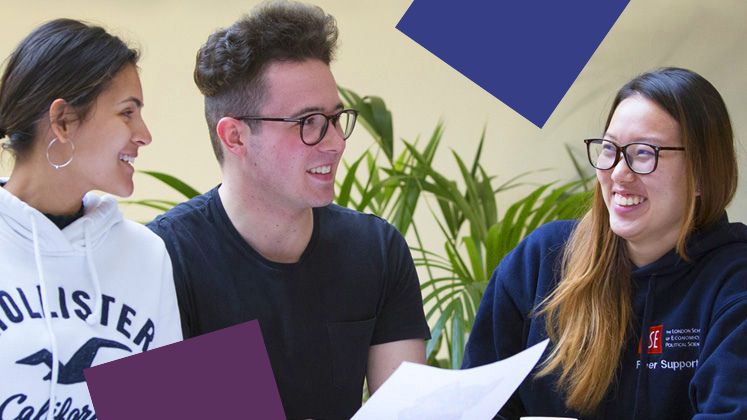
Information for UK students Read our advice and guidance for prospective Home/UK students

Information for international students Entry requirements for students studying outside of the UK

Entry requirements Accepted qualifications and the grades we're looking for


Completing the UCAS form How to complete the UCAS form and which supporting documents to provide

Personal Statement Advice on preparing and writing your personal statement

UCAS reference Information for teachers and schools

Additional Information Our policy on providing supporting documents as part of your application
Username or email *
Password *
Forgotten password?
[email protected]
+44 (0)20 8834 4579
A-Level Choices: How to Decide
- Scotland Scrapping Climate Targets: What You Need to Know
- The Moral, Ethical and Legal Terrain of Assisted Dying
- US-China Tensions Grow Over Electric Cars
- Microsoft Opening London Office for AI Development
- The UK Spring Budget 2024
- What is a Foreign Legal Consultant?
- Must-Follow Social Media Accounts For Law Students
- What Do In-house Lawyers Do?
- What IB Subjects Should I Take For Law?
- 11 Key Considerations When Applying to UK Law Firms

If you’re interested in a career in law , you’ve probably been told to consider doing the ‘right’ A-level subjects, to give you the best chance of avoiding disappointment later. But do they even exist?!
While law schools don’t have specific subject requirements, there are some factors to keep in mind when choosing your A-levels.
Want to become a law student? Start by booking a free ticket to one of our ‘Get into Law’ TLP Aspire events in 2018!
A-Level Choices: Essay-Based Subjects
It is no secret that a law degree will involve a huge amount of writing essays and, therefore, it is usually recommended to take at least one subject that will develop these skills, which you can talk about in your personal statement. Universities and certainly employers in the legal sector look for candidates who showcase the ability to write coherently, reason and argue. As a result, A-levels in English literature or history are highly regarded subject choices.
On the other hand, having sciences or maths alongside an essay-based subject is also seen as very impressive since these students have a strong ability in problem-solving, logic and analysis – which are key skills needed for a law degree and certainly a career in law.
A-Level Choices: Facilitating Subjects
Whilst not strictly necessary, it’s worth bearing in mind the idea of facilitating subjects. According to some Russell Group universities, you must have at least two facilitating subjects as part of your A-levels.
Facilitating subjects are traditional academic subjects which allow you to keep your options open for the future and enable you to develop many key skills needed for any career within law. They include maths, English literature, physics, biology, chemistry, history, geography and a foreign language.
A-Level Choices: Good Grades
If you would like to secure a spot in one of the Russell Group universities, getting good grades is essential, which is why it is so important to pick subjects that you not only enjoy, but can also excel in.
Many of these universities also emphasise their selection process in choosing strong, academically-able students suited to this challenging degree. This is why top universities and big commercial firms ask for between AAB-A*AA. Below are only a few examples of A-level entry requirements from some top universities:
- University of Oxford: AAA
- London School of Economics and Political Science: A*AA
- University of Durham: A*AA with LNAT
- University of York: AAA
>> Want to see more entry requirements for top UK universities? Take a look at our Uni-by-Uni comparison page!
A-Level Choices: Extended Project Qualification
Slightly unrelated to subject choices, however if your sixth form/college offers the opportunity to complete an EPQ, you should definitely do one related to law.
This is a great point of discussion in a law personal statement, in interviews and generally, it successfully shows your interest in the field.
A-Level Choices: Good Example Subject Combinations
Remember, almost all subject combinations which include at least two facilitating subjects are favoured. However, below are just a few good example combinations, popular with aspiring lawyers.
- English literature, history, maths
- English literature, maths, economics
- Chemistry, biology, history
- History, french, geography
A-Level Choices: Other Factors to Consider
But A-levels aren’t the only crucial aspect…
Competition for a law degree is increasingly high – there was a 4% increase in UCAS applications for law courses in 2017. Therefore, it is important to note that alongside good A-level subjects/grades, there are also other factors to consider:
Work Experience
Alongside good academia, work experience is equally as essential. Work experience proves to universities and future recruiters that you have a genuine interest in pursuing a career in this field.
Many firms and chambers offer short work experience placements for students in year 12 such as Pinsent Masons, Royds Withy King, BLP, Foot Anstey, Old Square Chambers, Matrix Chambers, and the list goes on. While it is not crucial for admission into a law degree, it would certainly put you to an advantage.
>> Read our new page on The Ultimate Guide to Law Work Experience for Year 12 Students as a starting point!
Personal Statement
Finally, your law personal statement should play a significant role in convincing admission tutors that you have a genuine interest for studying a law degree. Universities look for proof about the reasons why you want to pursue a law degree, which could be shown in the form of relevant work experience, related extra-curricular activities, EPQ’s or any books you have read that have a legal dimension.
Overall, as long as you are well informed about these key aspects, there is nothing stopping you from obtaining a place in a good university for a law degree.
Best of luck!
Published: 23/02/18 Author: Tvara Shah
Deciding on Law Careers? Read These!
- The Big Debate: Should I Take A-Level Law
- 4 Reasons Why You Should Do a Law Apprenticeship
- The Ultimate Guide to Law Work Experience for Year 12 Students

We’ve now sold thousands of tickets to our national series of free one-day events for aspiring lawyers and those that advise them – have you booked your free ticket yet?
Loading More Content

Before you go, check this out!
We have lots more on the site to show you. You've only seen one page. Check out this post which is one of the most popular of all time.
What Are Easiest A Level Subjects? (13 best options!)

For most students, choosing the right A-level subjects is an essential part of their educational journey as they prepare for higher education and their future career. The truth is that picking the right courses can be a challenging decision, particularly when it comes to which subjects to focus on.
There are some A Level subjects that are considered easier than others, and it takes time to research each subject and make an informed decision that will set you up for success in your future studies.
In this article, I will look at some of the easiest A-level subjects you can choose from.
Table of Contents
What Are Easiest A Level Subjects?
There are plenty of easy A level subjects out there that can help you get ready for higher education without having to put too much effort into studying them.
Below are the easiest A level subjects.
1- A level Environmental Science
Environmental Science is a reasonably easy A-Level, especially compared to traditional science subjects, including Mathematics, Chemistry, and Physics.
While it requires you to know some facts from the sciences and Geology, Sociology, and Political Science, I believe Environmental Science is one of the easiest A level subjects.
After taking the Environmental Science A Level course, you will learn more about the conditions for life on earth, methods to control pollutants, the sustainability of energy resources and agriculture, and biogeochemical cycles.

2- A Level Classical Civilisation
Classical Civilisation focuses on the study of ancient Greek and Roman Civilisation. I f you plan to pursue your humanities studies, I encourage you to consider taking Classical Civilisation A level, as it will teach you various disciplines, including art, archaeology, literature, and history .
Generally, Classical Civilisation A-Level is about stories and their meanings, making them easy to grasp.
Unlike Further Mathematics A level, you don’t need to memorize rigorous formulas or concepts to succeed in Classical Civilisation.

3- A level Drama and Theatre
If you plan to apply to drama school, Drama and Theatre A level is particularly useful and will better prepare you for Drama at university and for Creative Writing courses.
Typically, A-level Drama and Theatre is divided into three main components Drama and theatre, Creating original drama, and Making theatre (Source: AQA )
If you pick A-level Drama and Theatre, you can decide to specialize in performing, lighting, sound, set, costume, puppets, and directing.

4- A level Psychology
Psychology is also seen as an easy A Level subject because it focuses on understanding human behavior from different perspectives, such as social psychology or cognitive psychology.
In addition, psychology requires students to learn about theories related to memory formation or stress management, which help explain why people behave in certain ways or how they react to different situations.
If you decide to take psychology, you will need a good grasp of research methods so you can apply them to case studies or create experiments that investigate various psychological phenomena.
In addition, having a good understanding of scientific writing will help you write reports and essays with ease on topics related to psychology.
Psychology typically covers topics such as mental health disorders, psychological therapies, and theories of personality development, making it ideal for those interested in pursuing careers in healthcare or social sciences.

5- A Level English Literature
English Literature is an excellent choice, particularly if you enjoy reading and writing. Unlike the English Language, which focuses on grammar and syntax, English Literature looks at themes within texts such as love, death, and power dynamics.
English literature also covers literary criticism and analysis techniques that can be applied to any text you encounter in life.
The good thing about taking English Literature A Level is that it will teach you skills that will prove helpful in real life.

6- A-level History
Even though some students find A-level history quite difficult, if you enjoy learning history and are good at writing essays and subjects like English Literature, you will do well in A-level history. I also encourage you to do a lot of practice questions throughout the year.
History is a great subject if you have a passion for learning about past events and how they shaped our world today. In addition, History covers a wide range of topics from Ancient Greece to World War 2 (WW2) and beyond, so there’s always something new to learn.
As with any other A-level subject, there are lots of materials available online that can help you understand complex concepts more easily.

7- A level Geography
Most universities highly value A Level geography as it teaches students to understand the world around them as focuses on physical and human geography, which will benefit most majors (Source: AQA )
With its remarkable 98.6% pass rate, Geography A-Level is among the most popular and easiest A level subjects, and most students who took this course find it engaging.
A level Geography assessment generally consists of two written exams and a field data assessment. Even though the non-examination part may require some fundamental data analysis, this A level is still easy to pass.

8- A-Level Law
A-Level Law is not only one of the easiest A-level subjects, but it is also beneficial as it will give you an understanding of the role of Law in today’s society and raises awareness of the rights and responsibilities of individuals (Source: AQA )
In addition, you will develop your analytical ability, problem-solving, decision-making, and critical thinking skills by learning about legal rules and how and why they apply to real life.
Even though some students find A level Law content to be a little heavy, the subject is relatively easy. If you have good memory retention strategies and are willing to dedicate time to learning A level Law content will ace this A-level subject.

9- A-level Fashion and Textiles
Most students find A level Textiles easy because it is highly hands-on and coursework based. If you enjoy working with materials and fabric, you might find A-level Fashion and Textiles enjoyable, making it easier for you.
Even though this A level is easy, it is not for everyone. I will only recommend this A-level subject to students who love arts and design.
To successfully pass A-level Fashion and Textiles, you must construct a quality portfolio of work to showcase the skills you have developed over the past couple of years.

10- A-level Media Studies
If you love anything media-related, A-level Media Studies will not only be easy, but it will be fun for you.
After passing A-level Media Studies, you will deepen your understanding of media, including media industries, language, representation, and audiences (Source: AQA )
In addition, you will be required to study media products related to film, television, radio, magazines, newspapers, advertising and marketing, online, social and participatory media, music videos, and video games.
The good news is that 30% of your A-Level is about a short film or screenplay with your photographed storyboard, making it an excellent way to unleash your creativity.

11- A level Information Technology (IT)
Information Technology (IT) is another easy A level mainly because of the simplicity of the exams and its course content.
Passing A level Information Technology will help you develop a wide range of IT skills and learn how to solve IT-related problems in various situations efficiently (Source: Cambridge University Press And Assessment )
I will rank this A level among the most useful and easiest, particularly if you are passionate about learning about emerging technologies and their effect on society.

12- A level Health and Social Care
I recommend you consider taking A-level Health and Social Care if you want to pursue a career in health.
If you decide to take A level Health and Social Care, you will learn about how poverty, mental health, and the use of recreational drugs impact individuals. In addition, you will also have a deeper understanding of human rights, the law, and contemporary issues in social policy.
A level Health and Social Care is another easy A-Level subject. The good news is that this A level subject is BTEC, equivalent to two A-Levels.
What makes A level Health and Social Care fairly easy is that it comprises practical placements and work experience, making it perfect for learning hands-on experience (Source: Pearson Education )

13- A-level Religious Studies
Typically, A-level Religious Studies has two components philosophy of religion and ethics and Study of religion and dialogues (Source: AQA )
A-level Religious Studies has about a 99% pass rate, making it one of the easiest and one of the most popular A level subjects.
A-level Religious Studies assessments are opinion-based mainly, backed by your ability to write persuasively. You will successfully pass A-level Religious Studies by mastering if you have above average ability to write argumentative essays.

Wrapping Up
No matter which A Level subject you choose, it is important to remember that all require dedication and hard work if you want to succeed academically.
However, there are some courses that may be easier than others depending on your interests or strengths; I encourage you to choose A level courses that will suit your needs best.
Whether you choose Classical Civilisation, Environmental Science, or Law, I encourage you to pick A level subjects that interest you the most so that you don’t get bored while studying them.
I am Altiné. I am the guy behind mathodics.com. When I am not teaching math, you can find me reading, running, biking, or doing anything that allows me to enjoy nature's beauty. I hope you find what you are looking for while visiting mathodics.com.
Recent Posts
How to Find the Y-Value of Stationary Points with TI-84 Plus CE
TI-84 Plus CE Calculator If you’re studying calculus or any advanced math course, you will certainly come across the concept of stationary points. So, what is a stationary point? A...
IB Maths Vs. A-Level Maths - Which One is Harder?
Maths is a subject that can be demanding for many students. It not only requires strong analytical skills but also an ability to handle complex concepts with ease. Students looking to further their...
A-Level Subjects & Choices For Best Subject Combinations

Embarking on the A-level journey is a pivotal moment in a student’s academic life, representing a bridge between the structured foundation of high school and the specialized focus of university studies. A-levels, or Advanced Level qualifications, allow students to delve deep into subjects of their choosing, shaping their educational trajectory and paving the way for future careers. From the sciences like Mathematics, Physics, Chemistry, and Biology to humanities such as English Literature, the breadth of A-level subjects caters to diverse interests and aspirations.
Ignite Training Institute stands out as a leading hub for A-level subject tutoring in Dubai, offering expert guidance in key disciplines like Maths , Physics , Chemistry , Biology , English , and more. With a commitment to personalized learning and a team of dedicated tutors, Ignite empowers students to navigate the intricacies of A-level studies, ensuring not only academic success but also a profound understanding and appreciation for their chosen subjects.
Table of Contents
What Are All The A-Level Subjects?
Popular a-level subject combination, what are the toughest a-level subjects, how to choose the right a-level subjects for yourself, ignite training institute – #1 a-level subject tutors in dubai.
A-levels, or Advanced Level qualifications, are a key component of the British education system and are widely recognized internationally. These qualifications are typically pursued by students in the final two years of their secondary education, commonly referred to as the sixth form or college. A-levels are chosen based on individual interests, career aspirations, and university entry requirements.
The subjects available for A-level study cover a diverse range of disciplines, allowing students to tailor their education to their unique preferences.
1. Sciences:
- Environmental Science
2. Mathematics:
- Mathematics
- Further Mathematics
3. Humanities:
- English Literature
- Religious Studies
4. Social Sciences:
5. languages:.
- Classical Greek
6. Creative Arts:
- Art and Design
- Drama and Theatre Studies
7. Computer Science & ICT (Information and Communication Technology):
- Computer Science
- Information Technology
8. Physical Education (PE) & Sports Science:
- Physical Education
- Sports Science
9. Business & Economics:
- Business Studies
10. Other Subjects:
- Design and Technology
- Media Studies
- Critical Thinking
- General Studies (though it’s no longer offered by many schools)
11. Modern & Ancient Languages:
- Ancient Greek
It’s important to note that the availability of subjects can vary between schools and colleges, and curriculum changes may have occurred since my last update. Students typically choose three to four A-level subjects, and the combination of subjects depends on individual preferences, academic strengths, and future career goals.
Related: A-Level Subjects For Psychology: Ideal Subject Combinations
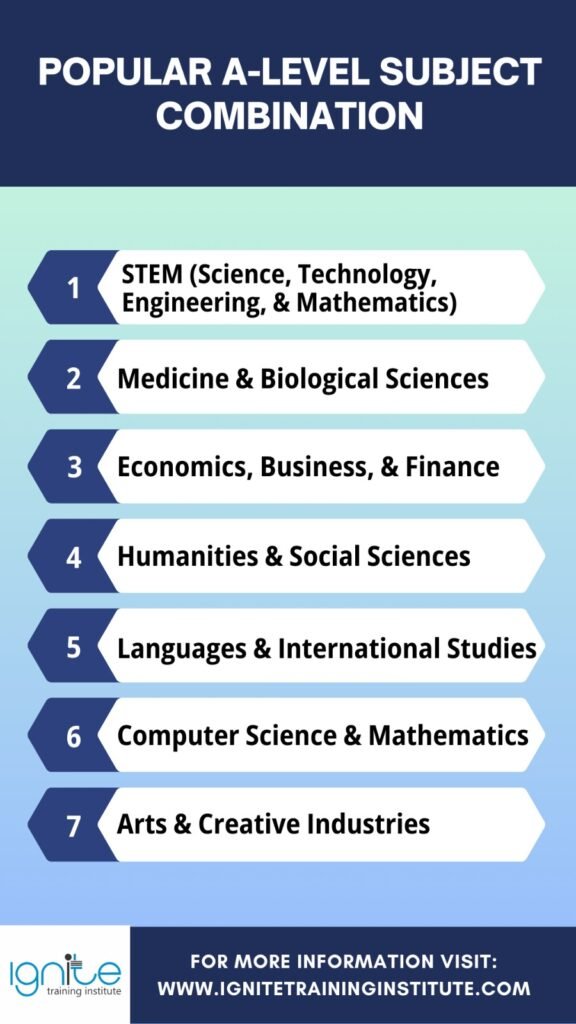
Choosing the right combination of A-level subjects is a crucial decision for students as it can significantly impact their future academic and career paths. While the choice ultimately depends on individual interests, career aspirations, and university entry requirements, there are some popular A-level subject combinations that students often consider.
Keep in mind that the popularity of subject combinations can vary based on factors such as regional preferences and educational institutions. Here are some commonly chosen A-level subject combinations:
STEM (Science, Technology, Engineering, & Mathematics)
This combination is popular among students interested in pursuing careers in engineering, physics, computer science, or other STEM-related fields. It provides a strong foundation for university programs in engineering, physics, computer science, and related disciplines.
Medicine & Biological Sciences
- Mathematics or Physics
Aspiring doctors, biologists, and those interested in health-related fields often opt for this combination. Some medical schools may require Biology and Chemistry, and adding Mathematics or Physics can broaden the range of potential university courses.
Economics, Business, & Finance
- Business Studies or Further Mathematics
This combination is suitable for students aiming for careers in economics, finance, business, or related fields. The inclusion of Mathematics or Further Mathematics enhances analytical skills and is often preferred by universities offering economics and finance programs.
Humanities & Social Sciences
- English Literature or History
- Sociology or Philosophy
Students interested in pursuing degrees in humanities or social sciences may choose this combination. It offers a balanced mix of subjects that develop critical thinking, analytical, and communication skills.
Languages & International Studies
- Modern Foreign Language (e.g., French, Spanish)
- Geography or Politics
For those interested in languages, international relations, or global studies, this combination provides a well-rounded set of skills. It is particularly beneficial for students considering careers in diplomacy, international business, or translation.
Computer Science & Mathematics
- Further Mathematics or Physics
This combination is ideal for students passionate about computer science and mathematics. It is highly valued by universities offering computer science, software engineering, or mathematics-related programs.
Arts & Creative Industries
- Art and Design or Drama and Theatre Studies
- English Literature or Media Studies
- Music or another creative subject
Students with a flair for the arts and creativity may choose this combination. It provides a foundation for pursuing degrees in fine arts, literature, media studies, or performing arts.
It’s important to note that while these combinations are popular, there is flexibility in choosing A-level subjects based on individual interests and goals. Students should thoroughly research university entry requirements for their desired courses and seek guidance from teachers or career counselors when making their decisions.
Additionally, some universities may have specific subject requirements for certain courses, so careful consideration is essential when planning an A-level subject combination.
Related: Guide To A-Levels Subjects For Different Career Options
Determining the “toughest” A-level subjects can be subjective and varies from student to student based on individual strengths, interests, and learning styles. What proves to be a challenge for one student might be an area where another student excels. Nevertheless, some A-level subjects are often perceived as more demanding due to their complexity, depth, or the intensity of the workload.
Keep in mind that perceptions of difficulty can also be influenced by personal preferences and strengths. Here are some A-level subjects that are commonly considered challenging:
1. Further Mathematics
Further Mathematics is often regarded as one of the most challenging A-level subjects. It builds on the content of Mathematics A-level and delves into more advanced topics such as complex numbers, matrices, and differential equations. The rigorous mathematical reasoning and abstract concepts can make it demanding for many students.
Physics is known for its theoretical complexity and the need for a strong grasp of mathematical concepts. The subject involves understanding abstract theories, applying mathematical principles to real-world scenarios, and conducting experiments. The combination of theory and practical components can be challenging for some students.
3. Chemistry
Chemistry is considered demanding due to its detailed theoretical content, laboratory work, and the need for precision in experimental techniques. Students often find the understanding of complex chemical reactions, molecular structures, and quantitative analysis to be intellectually challenging.
While Biology may be perceived as more accessible than Physics or Chemistry, it can still be demanding due to the volume of content, intricate biological processes, and the requirement for memorization. The subject often involves a combination of theoretical knowledge and practical skills.
5. Mathematics
Mathematics at the A-level can be challenging for students who find abstract reasoning and problem-solving challenging. The subject covers a broad range of topics, including calculus, algebra, statistics, and geometry. A strong foundation in mathematical concepts is crucial for success in A-level Mathematics.
6. Economics
Economics is considered challenging because it requires analytical thinking, a solid understanding of economic theories, and the ability to apply economic concepts to real-world situations. Essay writing is often a key component, requiring students to articulate complex economic ideas coherently.
7. Further Physics
Some students may find Further Physics challenging due to its extension of A-level Physics topics into more advanced and abstract realms. Topics such as quantum mechanics and astrophysics can be intellectually demanding.
8. Modern Foreign Languages (e.g., Mandarin, Russian)
Learning a foreign language at the A-level can be challenging due to the depth of language skills required. This includes proficiency in speaking, listening, reading, and writing, along with an understanding of cultural nuances.
It’s crucial to note that the perceived difficulty of A-level subjects can vary based on individual strengths, interests, and prior knowledge. Students should carefully consider their aptitudes and aspirations when selecting A-level subjects.
Related: A Level Computer Science Course: A CIE & AQA Overview
Choosing the right A-level subjects is a crucial decision that can significantly impact your academic journey and future career opportunities. It’s important to select subjects that align with your interests, strengths, and long-term goals. Here are some steps to help you choose the right A-level subjects for yourself:
1. Identify Your Interests: Consider the subjects you genuinely enjoy studying. Reflect on your favorite subjects from your GCSEs and any hobbies or extracurricular activities you’re passionate about. Identifying your interests can be a great starting point for choosing A-level subjects that you’ll find engaging and fulfilling.
2. Explore Career Aspirations: Think about your long-term career goals. Research the academic requirements for your desired university courses or professions. Some careers may have specific subject prerequisites, so aligning your A-level choices with your career aspirations is essential.
3. Assess Your Strengths & Weaknesses: Reflect on your academic strengths and areas where you may need improvement. Consider subjects in which you have performed well during your GCSEs and those that align with your natural aptitudes. At the same time, be open to challenging yourself and improving in areas where you may have weaknesses.
4. Consider University Requirements: Research the entry requirements for the universities and courses you are interested in. Some degree programs may have specific A-level subject requirements or preferences. Ensure that your chosen subjects are compatible with your desired university pathway.
5. Think Long-Term: Consider the long-term implications of your A-level choices. While it’s essential to select subjects that interest you now, think about how these choices might contribute to your future academic and career paths. Choose subjects that provide a solid foundation for your chosen field of study.
6. Seek Advice: Consult with teachers, career counselors, and subject specialists. Teachers can provide valuable insights into the demands and expectations of different A-level subjects. Career counselors can offer guidance on how your choices align with your career goals. Discussing your options with knowledgeable individuals can provide a well-rounded perspective.
7. Keep Options Open: Choose a balanced combination of subjects that keeps your options open. While specialization is essential, having a mix of subjects can provide versatility and flexibility in your academic and career choices. This is especially important if you’re unsure about your exact career path.
8. Consider Your Learning Style: Reflect on your preferred learning style. Some subjects may involve more theoretical content, while others may have a practical or creative focus. Choose subjects that align with your learning preferences to enhance your overall academic experience.
9. Balance Challenge & Manageability: Strive for a balance between challenging yourself and ensuring manageability. While it’s beneficial to push yourself academically, taking on too many highly demanding subjects can lead to stress and burnout. Consider your workload and how well you can manage the demands of your chosen subjects.
10. Review & Reflect: Review your A-level choices and reflect on your progress. If you find that a particular subject is not aligning with your interests or goals, explore the possibility of making adjustments. It’s okay to reassess and adapt your choices based on your evolving interests and aspirations.
Related: AQA VS CIE: A Closer Look Into The Examination Boards
Ignite Training Institute proudly stands as the premier destination for A-level subject tutoring in Dubai, earning its reputation as the number one choice for ambitious students seeking excellence in their academic pursuits. With a team of highly qualified and experienced tutors, Ignite is committed to providing top-notch educational support and guiding students through the challenging A-level curriculum with expertise and dedication.
The institute’s personalized approach ensures that each student receives tailored assistance, fostering a conducive learning environment where individual strengths are nurtured and weaknesses addressed. Ignite Training Institute’s commitment to academic success, state-of-the-art facilities, and innovative teaching methodologies make it the go-to destination for students aspiring to achieve outstanding results in their A-level examinations.
1. What Is The Subject For A-Level?
A-levels offer a diverse range of subjects, including but not limited to Mathematics, Physics, Chemistry, Biology, English Literature, History, Economics, and more, allowing students to specialize in their chosen fields during the final two years of secondary education.
2. Which Subject Is Hardest In A-Level?
Determining the hardest A-level subject is subjective, but Further Mathematics is often considered challenging due to its advanced mathematical concepts. However, the difficulty can vary based on individual strengths and interests.
3. What Are The A-Level qualifications?
A-level qualifications, or Advanced Level qualifications, are advanced academic certifications taken by students in their final two years of secondary education, covering a diverse range of subjects and serving as a key prerequisite for university admission.

In conclusion, A-level subjects form the backbone of a student’s academic journey, providing a platform for in-depth exploration and specialization in diverse disciplines. The choices made during this pivotal period not only shape academic trajectories but also influence future career paths.
Whether delving into the complexities of the sciences, exploring the nuances of humanities, or mastering the languages and arts, A-levels empower students to hone their skills and knowledge in areas of personal interest. The journey through A-levels is both challenging and rewarding, offering opportunities for growth, self-discovery, and the acquisition of valuable skills.
Related: What Is The Difference Between Edexcel & Cambridge? 5 Facts
Ignite Training Institute
Recent posts.
- IBDP Syllabus Changes For 2025: Physics, Chemistry, & Biology
- AP Courses For Engineering: Best Subjects To Prepare
- Homeschooling In UAE (Private Candidacy): How To Begin?
Edexcel A-Level Maths: Syllabus, Assessment, & Grade Boundaries
- A-Level Maths: Topics & Exam Preparation Tips For Student
- Advanced Placements (AP)
- British Curriculum
- Homeschooling
- International Baccalaureate (IB)
- Standardized Tests
- Subject Choices
- Uncategorized
- Universities
Get In Touch

Seek Expert Tutor Support in Dubai
Receive tailored academic support for IB, IGCSE, A-Levels, AP, ACT, EmSAT, & Homeschooling.
Read More Blogs

A-Levels VS CBSE: Comparing World’s Top Education Systems

A-Level Arts Subjects: A Guide To Choosing Class 11 Subjects

Claim Your Free Consultation
Get personalized advice for your tutoring needs, still confused on how to go forward, new batches targeting may’25 ap exams starting on 15th august'24, new batches targeting may’24 ap exams starting on 15th august'23.
Programmes & Qualifications
Cambridge international as level english general paper (8021).
- Syllabus overview
This syllabus builds learners' ability to understand and write in English through the study of a broad range of contemporary topics. They will analyse opinions and ideas and learn how to construct an argument. This syllabus develops highly transferrable skills including:
- how to develop arguments and present reasoned explanations
- a wider awareness and knowledge of current issues
- independent reasoning, interpretation and persuasion skills
- the ability to present a point of view clearly and reflect upon those of others.
The syllabus year refers to the year in which the examination will be taken.
- -->2022 - 2024 Syllabus update (PDF, 136KB)
- -->2025-2027 Syllabus (PDF, 530KB)
Syllabus support
- -->Support for English General Paper (PDF, 946KB)
Important notices
Find out more about our range of English syllabuses to suit every level and ambition.
For some subjects, we publish grade descriptions to help understand the level of performance candidates’ grades represent.
We paused the publication of grade descriptions in response to the Covid-19 pandemic and the temporary changes to the awarding standard in 2020, 2021 and 2022.
As the awarding standard has now returned to the pre-pandemic standard, we are working to produce up-to-date grade descriptions for most of our general qualifications. These will be based on the awarding standards in place from June 2023 onwards.
School Support Hub
Teachers at registered Cambridge schools can unlock over 30 000 teaching and learning resources to help plan and deliver Cambridge programmes and qualifications, including Schemes of work, Example candidate responses, Past papers, Specimen paper answers, as well as digital and multimedia resources.
Schemes of work
Example responses, past papers, specimen paper answers.
Register your interest in becoming a Cambridge School
Stay up to date
Sign up for updates about changes to the syllabuses you teach
- Past papers, examiner reports and specimen papers
- Published resources
The 10 Easiest A-Level Subjects – Ranked for 2024
In A-Level by Think Student Editor May 19, 2019 34 Comments
As a step up from GCSEs, A-Levels can be entirely different from them. This can make it hard to figure out how well a subject might suit you, even if you’ve studied it at GCSE. Seeing how other students have found the course can be a great way of learning more about the courses you can study without having to experience them for yourself.
Continue reading to learn which A-Level subjects students consider the easiest. This article will take you through the rankings and give you some insight into why students may feel that this course is easy.
Be advised. The ranking of the A-Level subjects in this list is not definitive. Every student will have individual strengths and weaknesses, and so will find some subjects more challenging than others. Additionally, judgements about the hardest A-Levels depend on the criteria that it is based on. In this article we have tried to take into account many different factors that make certain A-Level subjects challenging, but still, keep in mind that the list here is formed of opinions which are based on polling. Although you may want to take them into account when choosing your A-Level subject, you should also think about what your specific skills are and what it is that interests you when choosing your A-Level subjects.
Easiest A-Levels: Student Perception vs Pass Attainment Rates
Below you can find the visualisation A-Level subject difficulty rankings (top – easiest, bottom – 11ᵗʰ easiest). Displayed on the chart are both our own internal polling results and our analysis of pass attainment rates (a grade C or above) for the 2022 cohort.
Click a chart legend (colour key) to filter the ranking by specific metric.
(*) Difficulty perception represents the proportion of students who voted that specific subject as the easiest A-Level during our polling. You can learn more about how we collected this data at the end of this article. (**) Pass attainment rates refer to the proportion of students in 2022 who achieved a C or above. This data was collected from both here on Ofqual’s website and the this page from JCQ.
Walkthrough of the A-Level difficulty rankings
This section will explain if there’s a relationship between the easiest subjects and the pass rates as well as explain why students may feel these subjects are the easiest. If you want to have your say, please vote in the poll at the end of this article.
10. A-Level Maths
2.12% of the poll considered A-Level Maths as the easiest A-Level, putting it in 10th place. In 2022, 78.5% of students achieved a grade C or above and 22.8% of students achieved an A*. As the average for all subjects was 14.5% achieving an A*, it would seem that A-Level Maths, really is one of the easiest A-Level subjects as it allows students to do so well.
However, A-Level Maths is also considered one of the hardest A-Levels and on our ranking is in 4th place for the most difficult. As this doesn’t quite add up, it’s important to note that how different students perceive A-Level difficulty is entirely personal and can vary greatly, as shown with this subject.
Students may consider A-Level Maths easy due to there often being restriction on who can take it. This means that students will generally already have very good mathematical skills before even beginning the A-Level.
Due to this, students are quite likely to take other subjects that are considered difficult, such as A-Level Chemistry, A-Level Physics or even A-Level Further Maths. This may mean that they consider it easy in comparison to their other subjects, which are considered difficult . For more on this, check out our article on the most difficult A-Level subjects.
9. A-Level ICT
2.54% of the poll considered A-Level ICT as the easiest A-Level, putting it in 9th place. In 2022, 80.5% of students achieved a grade C or above and 9.6% of students achieved an A*.
The proportion of students getting above a grade C suggests that A-Level ICT is easier than A-Level Maths. However, it is still slightly lower than the average of all subjects, which has 82.1% of students gaining a grade C or above.
Students will often find A-Level ICT easy as a large portion of the course will be coursework. This means that students will have the chance to work towards part of their assessment rather than having to do it all through exams. This can make it easier as students have the opportunity to improve their work and make sure it’s their best.
During A-Level ICT, students learn about presenting information, networks, how ICT is used, database systems and more. While it will be in-depth and complex than at GCSE, students may find this easier as it is still quite straightforward . For more on this, check out this guide by WJEC.
8. A-Level Business
4.66% of the poll considered A-Level Business as the easiest A-Level, putting it in 8th place. In 2022, 83.2% of students achieved a grade C or above and 7.3% of students achieved an A*. This suggests that A-Level Business is one of the easiest A-Levels as the proportion of students who received a C or above is higher than the average.
In A-Level Business, students learn about different business-related areas, such as management, marketing, operations, finance, HR and business strategy. While this includes some theories and calculations, this content is fairly straightforward and easy to apply.
As an A-Level Business student myself, I find that similarly to at GCSE, A-Level Business is largely down to common sense and reasoning in order to answer questions, which makes it a lot easier than other subjects. Also, the exams come with a range of questions and so even if essays aren’t your strong point, you may still be able to bank enough marks on the shorter questions to still get a good grade. To learn more about how A-Level Business is, check out this Think Student article .
7. A-Level Religious Studies
6.78% of the poll considered A-Level Religious Studies as the easiest A-Level, putting it in 7th place. In 2022, 87.6% of students achieved a grade C or above and 12.5% of students achieved an A*. This suggests that A-Level Religious Studies is easier than A-Level Business as more students were able to achieve a grade C or above.
In A-Level Religious Students, students will learn about both a specific religion and the philosophy of religion as well as ethics. Due to this content, students may find A-Level Religious Studies easy as it is straightforward and easy to understand . To learn more about A-Level Religious Studies, check out this page by AQA.
6. A-Level Art and Design Subjects
8.47% of the poll considered A-Level Art and Design as the easiest A-Level, putting it in 6th place. In 2022, 90.3% of students achieved a grade C or above and 18.7% of students achieved an A*. This suggests that A-Level Art, in particular, is an easy subject that allows students to get the top grades as well.
This is likely due to the fact that students who choose A-Level Art or similar subjects are likely to be serious about this subject and very interested in it. This is especially as creating the art portfolio throughout your coursework will take a lot of time and effort.
Due to being something that students enjoy and even find easy themselves, A-Level Art and Design can be considered as one of the easiest subjects as there isn’t any actual content to learn or anything difficult except the actual application of your artistic skills. To learn more about what is studied, check out this page by AQA.
5. A-Level Law
8.69% of the poll considered A-Level Law as the easiest A-Level, putting it in 5th place. In 2022, 71.3% of students achieved a grade C or above and 8% of students achieved an A*.
As these figures are relatively low, it could suggest that A-Level Law is actual more difficult than students perceive it to be. The reasoning for this is unclear, which suggests that it may be a subject that some consider easy and other consider hard.
In A-Level Law, students learn about how the law works, and will study topics including the legal system in the UK, human rights and criminal law. Students may consider A-Level Law easy if they find the content of this straightforward. To learn more about A-Level Law’s content, check out this guide by AQA.
4. A-Level Geography
11.44% of the poll considered A-Level Geography as the easiest A-Level, putting it in 4th place. In 2022, 85.6% of students achieved a grade C or above and 11% of students achieved an A*.
This suggests that it is one of the easiest A-Levels as students performed much better than with A-Level Law and achieved above the average for all subjects. However, as the percentage of students that got an A* is slightly lower than it is for all subjects, it may suggest that getting the top grades is more difficult.
In A-Level Geography, students learn about both physical and human geography, focusing on topics, such as the water cycle, ecosystems and resource security. Due to this, students may find A-Level Geography easy as the content is often quite straightforward and easy to understand . Also, compared to other subjects, there isn’t that much of it, allowing it to be studied in greater depth and in more of a paced way.
Also, like with many humanities A-Levels, part of the course is examined with an NEA. This can make it easier for students as it means that not everything is relying on their final exams .
To learn more about A-Level Geography, check out this guide by AQA. For more information about the A-Level Geography NEA, check out this Think Student article .
3. A-Level Drama
12.50% of the poll considered A-Level Drama as the easiest A-Level, putting it in 3rd place. In 2022, 91% of students achieved a grade C or above and 14.9% of students achieved an A*. This suggests that A-Level Drama is an easy A-Level as so many students were able to do so well in it.
This is likely due to the fact that students who take A-Level Drama already have the basic skills needed to put together performances and to study different pieces, making it easier for them to access the new A-Level content .
Also, A-Level Drama may be considered easy due to the nature of the exams. This is because instead of their only being written exams as there are with most A-Levels, A-Level Drama also has practical exams, which make up large percentages of the assessment.
This may make students feel that A-Level Drama is easy as these students would have picked it due to their interest in the subject and so will likely also be good at the practical side of A-Level Drama . To learn more about how A-Level Drama is assessed, check out this page by AQA.
2. A-Level Film/Media/TV Studies
20.13% of the poll considered A-Level Film/ Media/ TV Studies as the easiest A-Level, putting it in 2nd place. In 2022, 87.5% of students achieved a grade C or above and 6.3% of students achieved an A*. While it is slightly lower than A-Level Drama, A-Level Film/ Media/ TV Studies still has a very high rate of students achieving a C or above, suggesting that it is one of the easiest A-Level subjects.
In A-Level Film/ Media/ TV Studies, students learn about different aspects of media or film/ TV content. This may include learning about the industries these exist in and studying specific aspects in depth, such as magazines or social media in A-Level Media, or studying specific films or TV shows in A-Level Film/ TV Studies.
Due to this, students may consider these A-Levels easy due to the content being straightforward. Also, as students may already be familiar with some of this content due to their wider world knowledge, this can make it even easier.
For more on what is studied in A-Level Media, check out this guide by AQA. For more on what is studied in A-Level Film Studies, check out this guide by OCR.
1. A-Level Sociology
20.76% of the poll considered A-Level Sociology as the easiest A-Level, putting it in 1st place. In 2022, 82.1% of students achieved a grade C or above and 9% of students achieved an A*.
While the figures for the proportion of students that achieved a grade C or above is high, suggesting that it is one of the easiest subjects. The proportion of students that received a grade A* is quite low, especially in comparison to the average of all subject being 14.5%.
This is likely due to students’ perception of A-Level Sociology being easy . This is because if they view it in this way, which clearly many do from even this ranking, some students may not realise how much effort they still need to put in to get the top grades.
In A-Level Sociology students learn about different aspects of society, such as education, crime, culture, poverty, the media and health. While students learn about this with some theory, the rest will be key elements, some of which they may already be aware of.
Due to this, students may feel that A-Level Sociology is easy due to the uncomplicated content. To learn more about A-Level Sociology, check out this page by AQA.
It is important to remember for A-Level Sociology and the rest of these subjects that students may find them easy for different reasons and that the ones suggested here may not apply to all students.
How were these rankings decided?
For each A-Level subject on this list, we discuss both of the following factors:
- Our findings through student polling (ranking factor)
- Our research on pass rates (based of Ofqual’s data release)
To prevent the complexity of attempting to combine these, we rank each subject by solely its student polling results. As stated, it isn’t perfect, and students should absolutely be taking these rankings with a pinch of salt.
How was the polling data collected?
Between January 2021 and January 2023, we displayed a poll on this page which prompted readers to vote on which A-Level subject was the easiest. Within this timeframe, we collect 472 votes, excluding submissions that were disregarded from the data set due to formatting issues or other errors.
Listed below are some key limitations of our polling methods that could’ve swayed results:
- Static ordering of subjects on voting form: A previous iteration of our survey form listed A-Level subjects in the same order each time. It could be argued that this would favour the subjects that were listed at the top. This issue has been fixed in our updated voting form below.
- Voting form displayed only a subset of A-Level subjects: Previously, only a small selection of A-Level subjects was displayed on the survey. We have since expanded the size of this selection on the voting form.
- Potential bad actors: Despite having anti-spam software in place, it is possible repeated entries were made by single individuals. With respect to privacy, we don’t ask for more information than we need and as a result, it is almost impossible to identify submission users to check if they are unique.
This article is a member of a series of A-Level ranking articles listed on this site. If you find our data and analysis within this article helpful, you may also wish to take a look at this Think Student article to find out which A-Level subjects are considered the hardest.
- Health and Social Care
- Physical Education
- Classical Subjects
- Media/Film/TV Studies
- Design and Technology
- Art and Design Subjects
- Further Maths
- English Language
- English Literature
- English Language & Literature
- Computer Science
- Foreign Languages
- Religious Studies
- Performing/Expressive Arts
Are these list of subjects under Cambridge or ial edexcel?
I’m sorry but I do OCR philosophy and ethics (religious studies) and it is not easy. Its 80% for an A, there is tonnes of content to learn (depending on your desired grade) and your own opinion gets you nowhere unless you have strong analytic skills (AO2) and good, extensive knowledge and even extra ‘nuanced’ knowledge to reach high grades (AO1). It is laughable to say religious studies is easier than art, film, drama etc.
Hope you are doing well. The problem we have is that there are many other people who contact us with the opposite opinion saying the same things as you, just for different subjects. Therefore, this article is ONLY based off what we have observed from interviewing students. Due to this being an “opinion piece” article, many people will disagree with it and others will agree with it.
That being said, your opinion has been logged and if enough people share your opinion, these rankings will change accordingly.
I completely agree, I do AQA RE and I can assure anyone that it is the hardest humanities subject out there. I do Geography (which is in fact fairly easy), History, Psychology and RE. And this is not me being dumb, I am predicted A*s for all my subjects, but RE is BY FAR the hardest.
Oh gosh no! Geography a-level is very difficult! You have to be able to write and argue multiple different opinions and facts, write under time pressure, learns lots of content!
Writing under time pressure and learning lots of content is something all essay-based subjects require
Definitely the easiest course I took. It may be difficult to get the highest grade but it’s equally difficult to fail.
For A level RS you need at least a 45/50 in each of the three two hour papers to get an A star, usually even higher. For example, I believe the 2018 new testament paper had a 47/50 grade boundary for an A star
Yep an A* is just over 90%
The grade boundaries are adjusted based off of how many people get that many marks, meaning that easier subjects have higher grade boundaries, and harder ones have lower grade boundaries. It takes more marks to get the grade because it’s easier to get marks. This isn’t based on the content, it’s based off of how well people actually do.
I think that these grade boundaries and opinions may be formed based on the old modualr specifications which, by admission, were relatively easy. The current grade boundary for an A is around 55% and a pass is 17%. Linear A-Level is a challenging A-Level.
Well James that is utter nonsense, RS is an extremely challenging subject, the content is difficult to grasp and there is a shed tonne of it, unless you have studied it you have no right to comment
I think the problem here is there are different exam boards and different courses for RS. Friends from other schools took other ones from me and they definitely found it easy – and when looking at my course (Edexcel modules: Philosophy of religion, Religion and Ethics, New Testatment), they couldn’t believe how intellectually difficult it was on top of the amount of content and theories etc you have to comprehend – including Kant’s categorical imperative, Hume, Aristotle. I have done a Philosophy degree and can factually say they new A level RS from Edexcel with above modules is like the … Read more »
its not but alr
how many minimum sujects we need to take to complete A level. how British council can help in teaching the subject? can we give exam from BC without enrolling in any accademic institutions? what is the minimum time we need to study for sitting for exam after enrole ment of name
I am Head of Year 13 at a Sixth Form. This list is potentially very misleading, since many of the subjects it features are much more demanding than the impression given by the author. While it is certainly true that some A levels are easier than others, this list goes against not only the opinions of any student I can think of who has been through our sixth form in the last decade (many of whom struggled greatly with RS in particular), but also with the views of such colleges as Trinity College, Cambridge University, who publish a list of … Read more »
sorry to bother you but i just wanted to ask how difficult alevel law is?
In my opinion, a-level religious studies should not be ranked as number one for easiest subject. I strongly feel as though the course is filled with many complex and intelligent ideas that you have to know and understand enough to enable you even a average grade.
I don’t think your assessments are accurate
I agree, they are very much incorrect
I had to smile when I saw your number one easy A Level – RE. I never took any A levels, but one of the O levels I took (and failed) was RE. Am I just a dumbo? Well, I got good passes in Maths, Physics, French and English, so maybe not that dumb. I also failed another one of your ‘easy’ subjects at O level – Geography. So I’m going to give you a C- for this list. Ciao.
As an RS teacher I can inform you that it is definitely not the easiest A Level. If only, my job would be far easier but as others have suggested getting 92% on any exam to get an A* is incredibly difficult. This is actually laughable and likely based on some sort of bias by the author, as opposed to actual evidence. If only any subject was based on someone’s opinion alone and a couple of theories. How about more than 100, if done correctly? Thank you though for adding to the nonsense already assumed by students when they take … Read more »
I see a lot of people quoting high grade boundaries as a reason why a subject is hard; it is, in fact, the opposite. The grade boundaries are adjusted based off of how many people get that many marks, meaning that easier subjects have higher grade boundaries, and harder ones have lower grade boundaries. It takes more marks to get the grade because it’s easier to get marks. This isn’t based on the content, it’s based off of how well people actually do.
Yes, that may be true but by that logic an E in RS can be achieved with 18%, which is good bit lower than quite a few subjects, such as history, geography, psychology, etc. and around the same as Bio. Thus indicating it is difficult by your standards, particularly for weaker or lazy students. So, even by your logic you ultimately are still refuted. Grade boundaries act to level the playing field between subjects to some extent, so at the end of the day just work hard to achieve a good grade in a subject you love.
Yeah no, I do Law and trust me it isn’t easy, this is biased and you have no proof whatsoever if these A levels are easy since I doubt you actually took them all and don’t even get me started on how some other learn. Depending on the person it could be hard or easy deciding on their rank of learning like one person might find religious studies easy but the other won’t (might I also add religions are associated with ethics and philosophy but I dont see them on the list so it doesnt add up). Everyone has their … Read more »
As an RS and Geography A-Level teacher I suspect there must be some bias from the author. It is misleading to suggest that all you need in RS is ‘an opinion’. I’m not sure whether they have actually looked at the extensive specification, or the extremely low grade boundaries (indicative of a difficult subject). I suspect that they may be referring to the old modular exam which was, by admission, relatively easy.
I agree with you. As another RS teacher I think the author must be referrring to the old specification. The new one is demanding, the subject is less than easy.
Your claim does not seem to have any supporting evidence as you point out. The Centre for Evaluation and Monitoring at Durham University stated that the old RS spec was ‘in the middle difficulty range, similar to Geography and more demanding than English’. This was replaced in 2016 with a more robust course which many students find challenging. I am just asking for fairness here as you are simply wrong. Have you studied the A level yourself?
Very insightful comment, thank you
‘Most of A-Level Religious Studies is your own opinion and ability to voice that opinion’ I think youre confusing A level with GCSE, have you looked at the A level Spec? Good luck trying to blag your way through comparing and critically analysing the strengths and weaknesses of various philosophical and theological thinkers such as Aristotle, Aquinas, Kant, Descartes, Fletcher, etc, armed only with your own opinion!
this is so true!!!!!! don’t forget about GE Moore, John Locke, Irenaeus, Skinner, Jeremy Bentham, Freud, Hume, William James, Augustine and so many more!!!
If anyone just so happens to read this comment please don’t use this article as a reason to do A level Geography!!! As someone who does A level geography, maths and biology I can say without a doubt that Geography is my most difficult by far! There’s about 16 case studies in total (which in an exam you’re expected to be able to write 3+ sides in 18mins) and the whole exam is extremely rushed compared to any other exam I’ve ever done. The case studies don’t even form half of the exam 🙁
A Level Drama easy? You have got to be kidding. 3 Hour written exam – yes, you can take in the scripts, but they must be clean copies, so no notes. Two 3000 word pieces of coursework/exam work One devised performance in the style of a recognised practitioner, who’s socio-economic and historical background you need to know and techniques you need to apply. One scripted performance with the same demands. You also have to negotiate your way through all the group work. So if you are a performing Psychologist/Sociologist with an understanding of economics and history, with the innate ability … Read more »

IMAGES
VIDEO
COMMENTS
French. The primary task that lies ahead of you in writing a French essay is, of course, to demonstrate your superior language skills. Keep the content itself very even-handed, sitting on the fence rather than presenting a forceful opinion that could distract attention away from the quality of your use of French.
Select the subjects below for details of the support resources available for each syllabus. Subject Group. A. Accounting - 9706. Afrikaans - Language (AS Level only) - 8679. Arabic - 9680. Arabic - Language (AS Level only) - 8680. Art & Design - 9479. B.
Subjects that need the student to write a lot of essays for the exams are referred to as essay-based subjects. History, languages, economics, and literature are some of the subjects that require a student to write frequent essays. Yet still, most of the humanity and social science subjects also need a lot of research and writing of essay papers.
The structure of an essay is divided into an introduction that presents your topic and thesis statement, a body containing your in-depth analysis and arguments, and a conclusion wrapping up your ideas. The structure of the body is flexible, but you should always spend some time thinking about how you can organize your essay to best serve your ...
The content and length of an essay depends on your level, subject of study, and course requirements. However, most essays at university level are argumentative — they aim to persuade the reader of a particular position or perspective on a topic. The essay writing process consists of three main stages:
Writing begins with understanding. When faced with an essay prompt, dissect it carefully. Identify keywords and phrases to grasp what's expected. Pay attention to verbs like "analyse," "discuss," or "evaluate.". These guide your approach. For instance, if asked to analyse, delve into the how and why of a literary element.
Also some universities publish a list of preferred A Level subjects that are acceptable for general admission, as well as specific requirements for individual courses. ... For example, a History department may be looking for students who can write essays and handle exams, and so might have a preference for A Level or Highers students. ...
Learn from the best with our extensive collection of IGCSE essay examples. Immerse yourself in successful narratives to understand the art of effective storytelling and elevate your writing to new heights. Stay up-to-date with the latest narrative essay topics for A level, O Level and IGCSE with our 2023 past paper questions.
Subjects marked with an asterisk (*) will only be counted as an essay-based subject if there is a minimum 50% essay-based or written response assessment as part of the overall award. ... Mathematics and Further Mathematics can be considered as two separate A Levels. If a student takes an A Level in their native language, it is at the discretion ...
It tells you the most common subject requirements for different degree courses at those universities. It also features a list of "facilitating subjects" and advises pupils wanting to be considered ...
**** The Department of Accounting considers Accounting equally with other generally preferred subjects. Therefore, they will consider Accounting alongside one other subject from the non-preferred list. However, the majority of departments continue to regard Accounting as a non-preferred subject. Essay based A-Level subjects: Art History
A-Level Choices: Essay-Based Subjects. It is no secret that a law degree will involve a huge amount of writing essays and, therefore, it is usually recommended to take at least one subject that will develop these skills, which you can talk about in your personal statement. Universities and certainly employers in the legal sector look for candidates who showcase the ability to write coherently ...
LSE publishes a list of A-levels it considers essay based (as well as its preferred and non-preferred subjects) which you can find on its admissions pages, which may be indicative. There is probably no exhaustive list though because there are so many A-level courses, including some very niche ones that might only have a couple hundred entries each year (particularly IAL exclusive subjects). It ...
1- A level Environmental Science. Environmental Science is a reasonably easy A-Level, especially compared to traditional science subjects, including Mathematics, Chemistry, and Physics. While it requires you to know some facts from the sciences and Geology, Sociology, and Political Science, I believe Environmental Science is one of the easiest ...
What Are The Toughest A-Level Subjects. Determining the "toughest" A-level subjects can be subjective and varies from student to student based on individual strengths, interests, and learning styles. ... Essay writing is often a key component, requiring students to articulate complex economic ideas coherently. 7. Further Physics
This syllabus develops highly transferrable skills including: how to develop arguments and present reasoned explanations. a wider awareness and knowledge of current issues. independent reasoning, interpretation and persuasion skills. the ability to present a point of view clearly and reflect upon those of others.
6. A-Level Art and Design Subjects. 8.47% of the poll considered A-Level Art and Design as the easiest A-Level, putting it in 6th place. In 2022, 90.3% of students achieved a grade C or above and 18.7% of students achieved an A*. This suggests that A-Level Art, in particular, is an easy subject that allows students to get the top grades as well.
A Level essay based subjects are not great prep for uni/work. You can learn to write well without having to study 'essay-based' subjects. 7 years ago. A. jb1702. Psychology, sociology, English lang/lit, history, govt & politics, law, religious studies, classics, and philosophy are all essay based. 7 years ago. A.